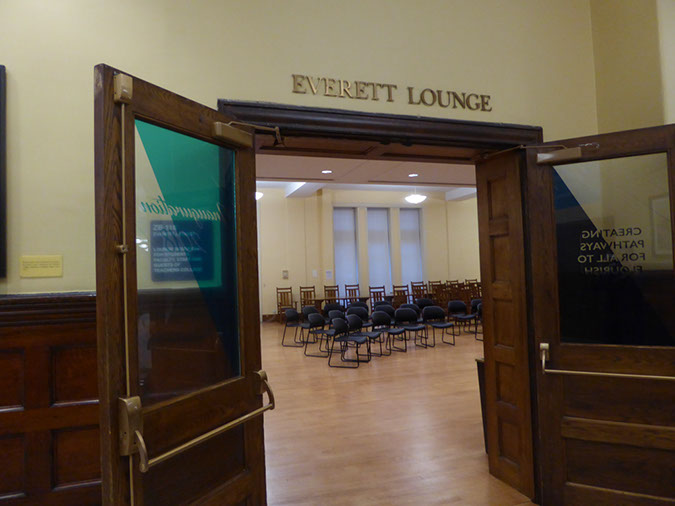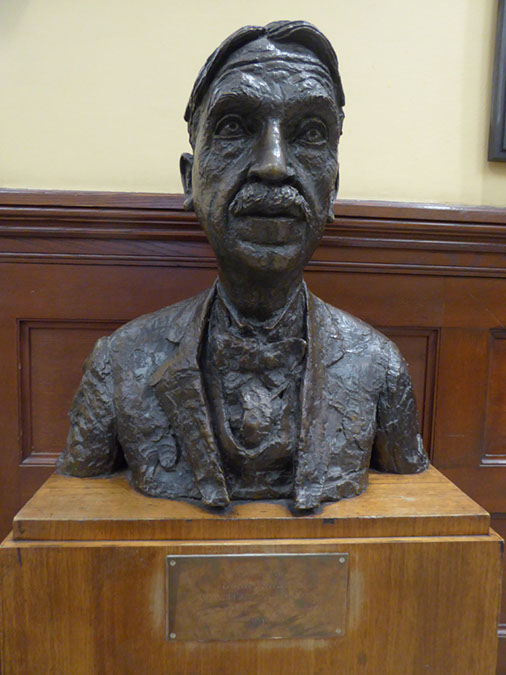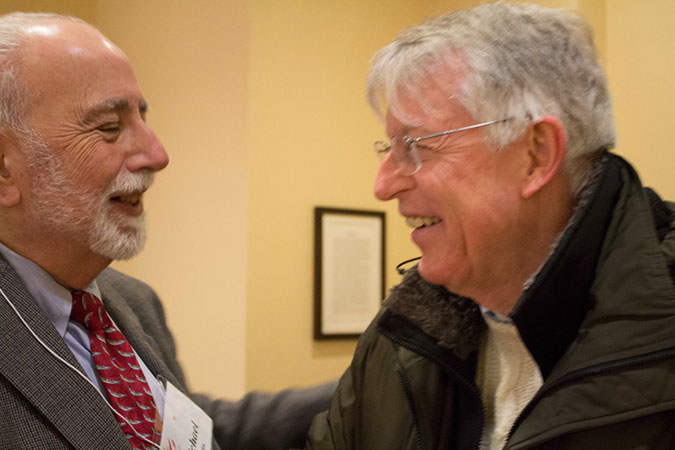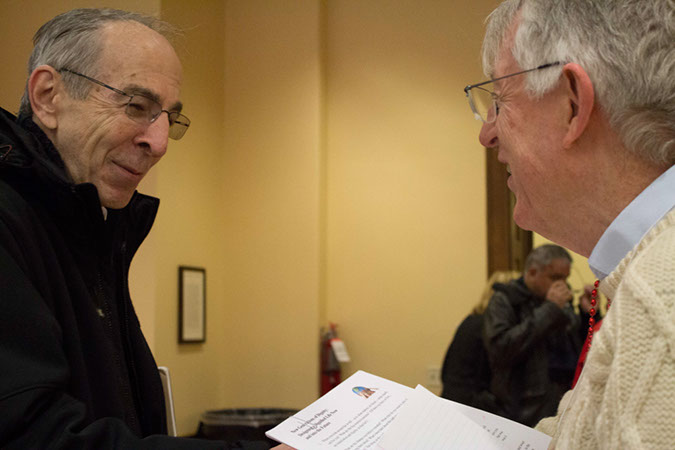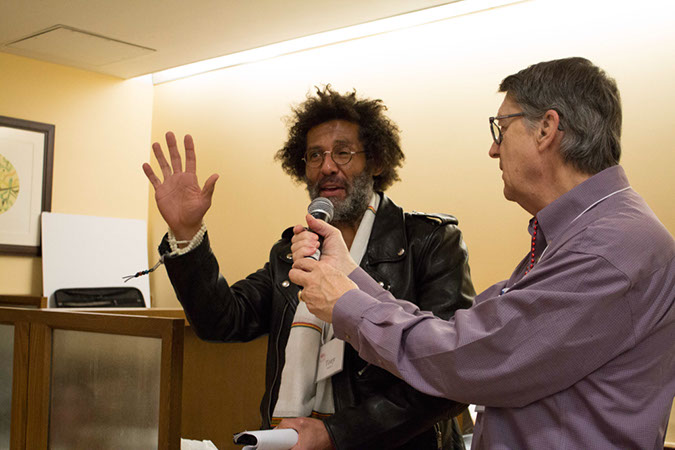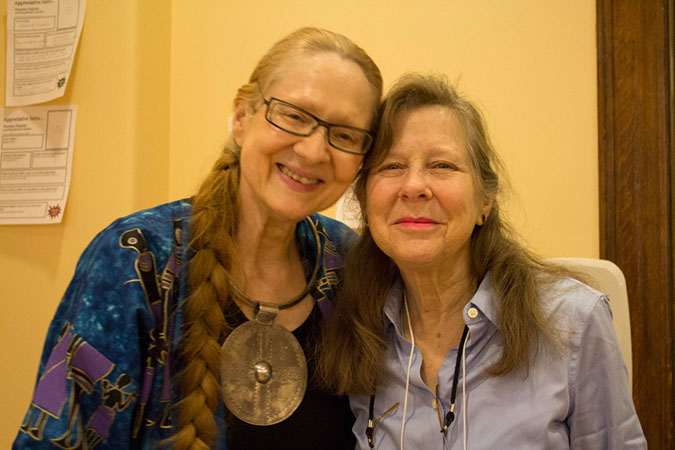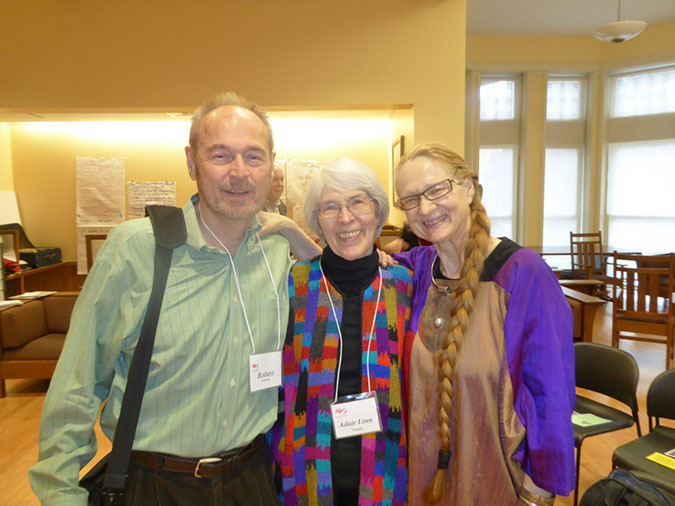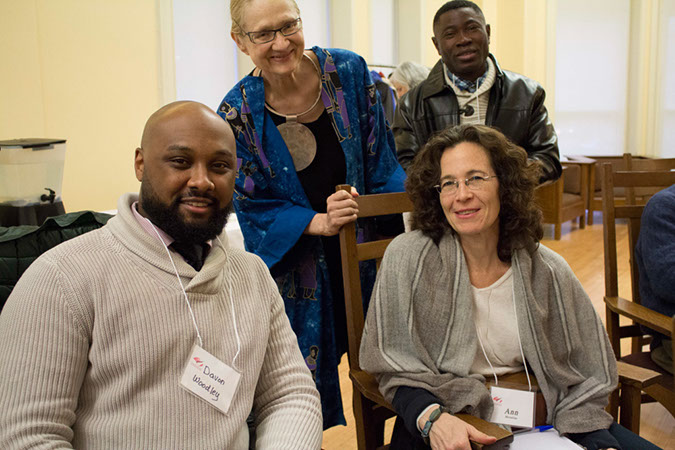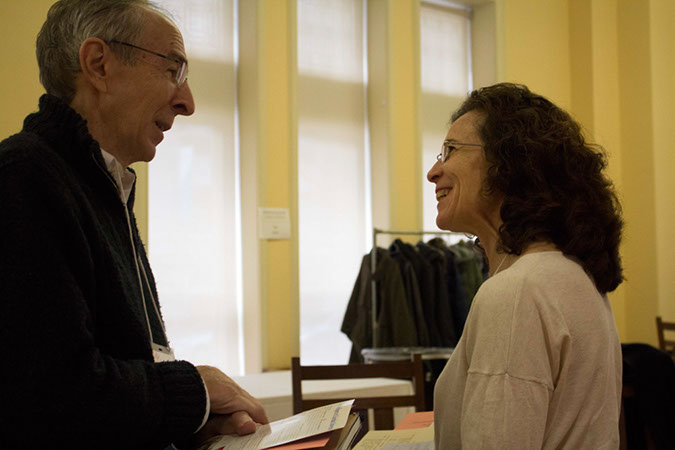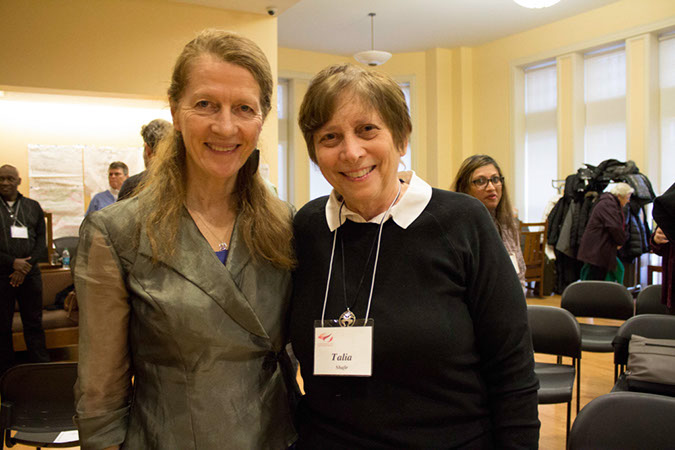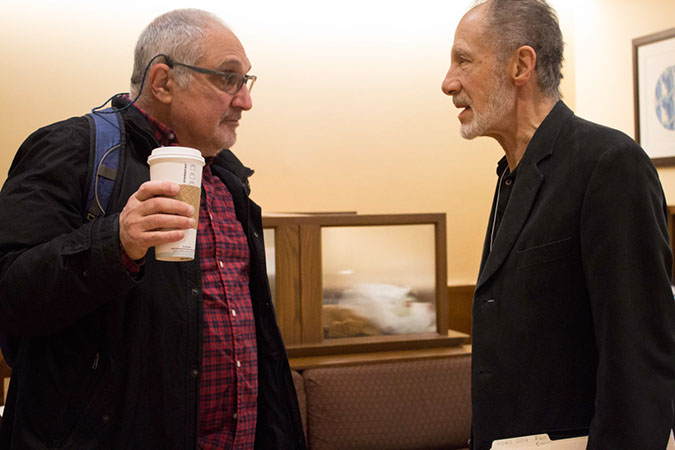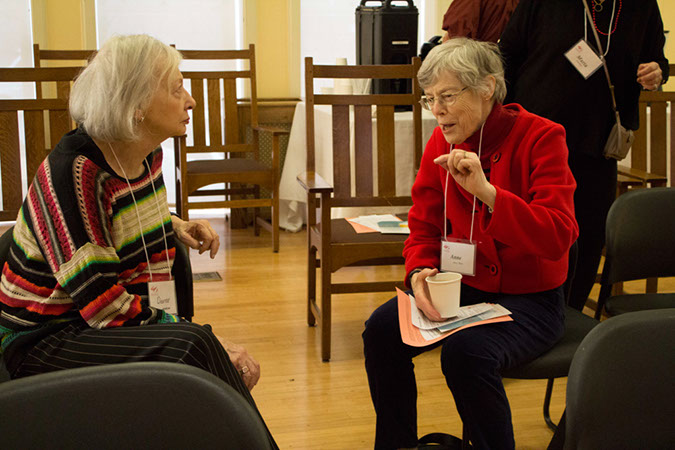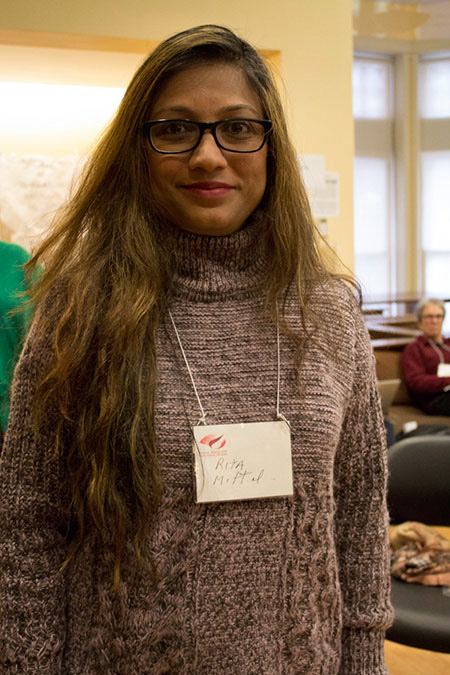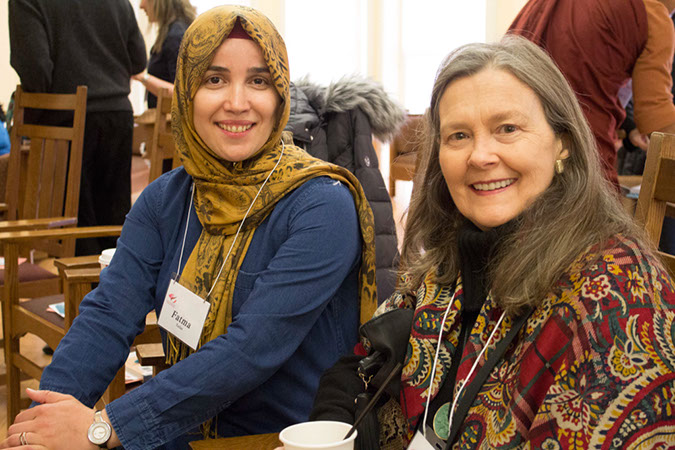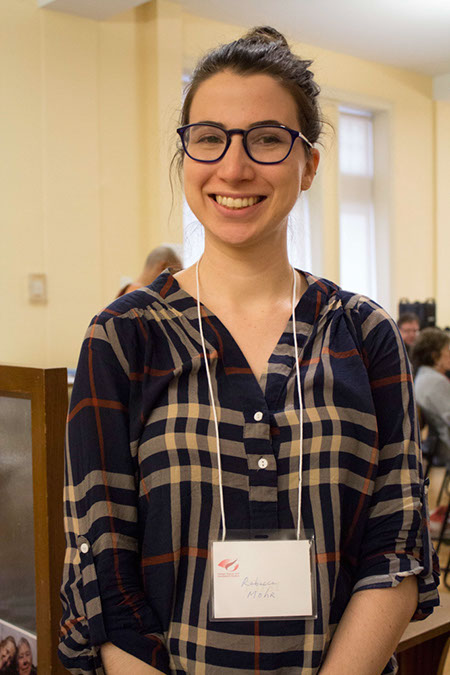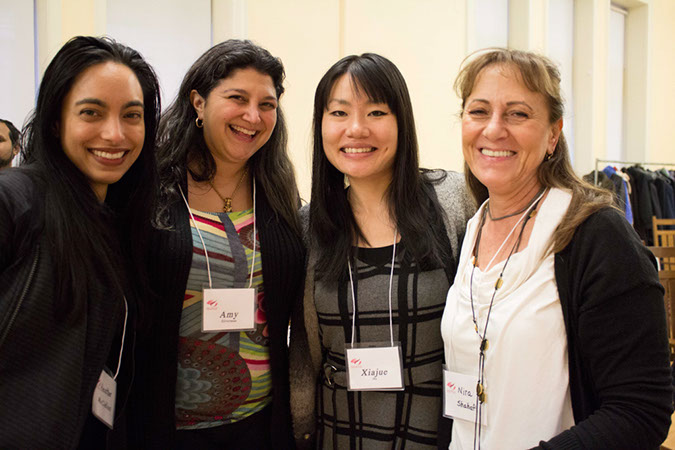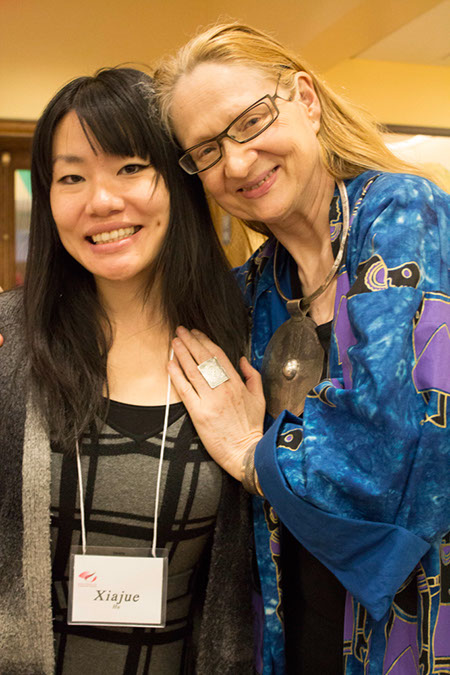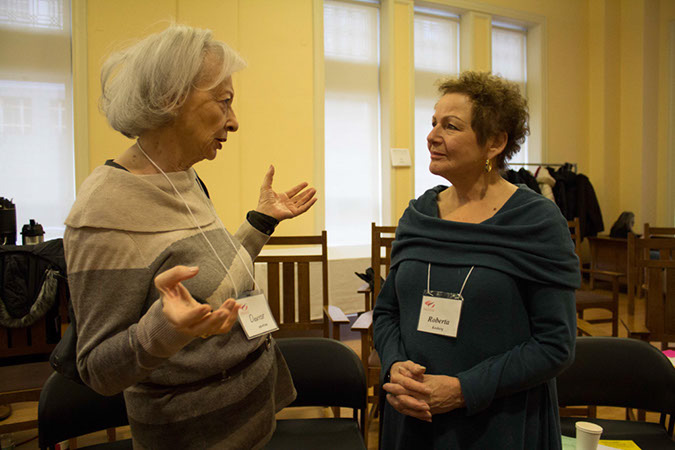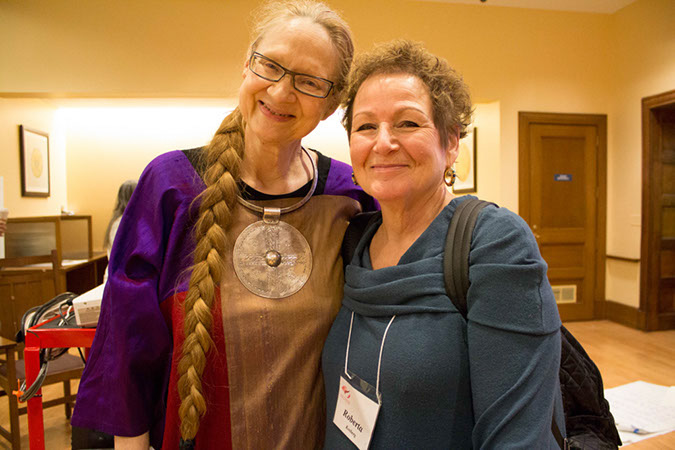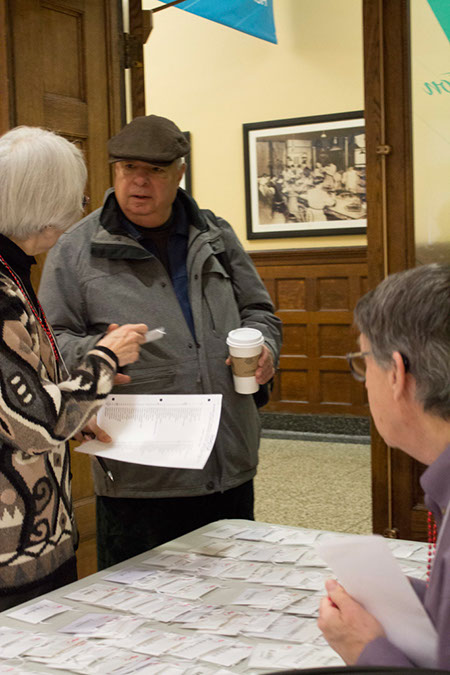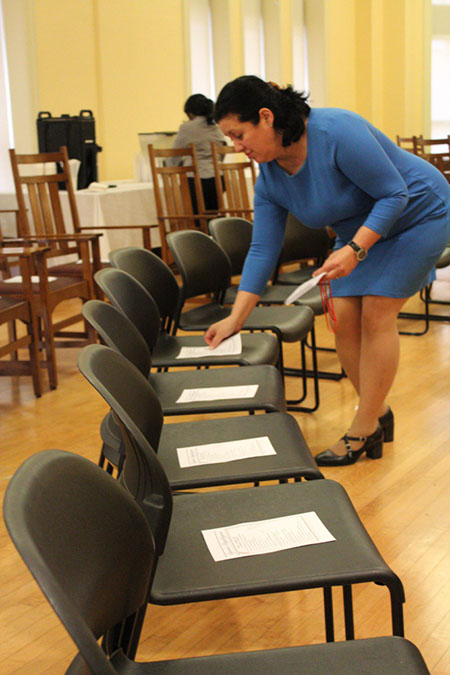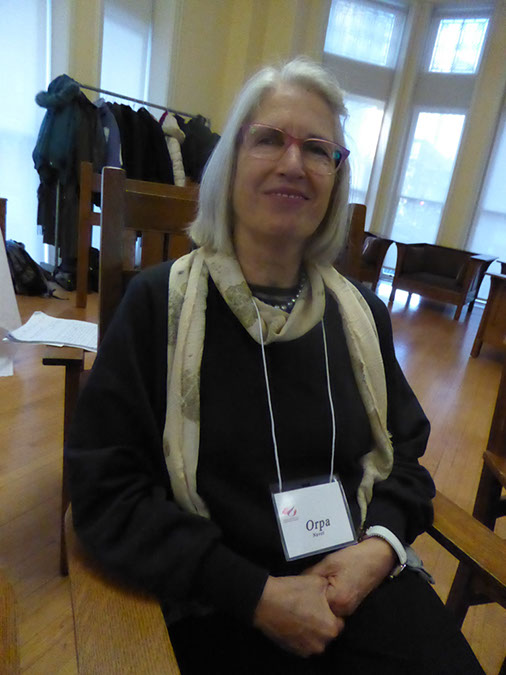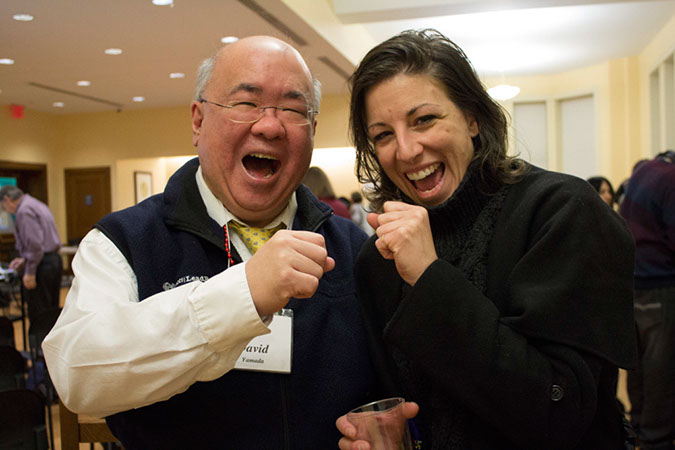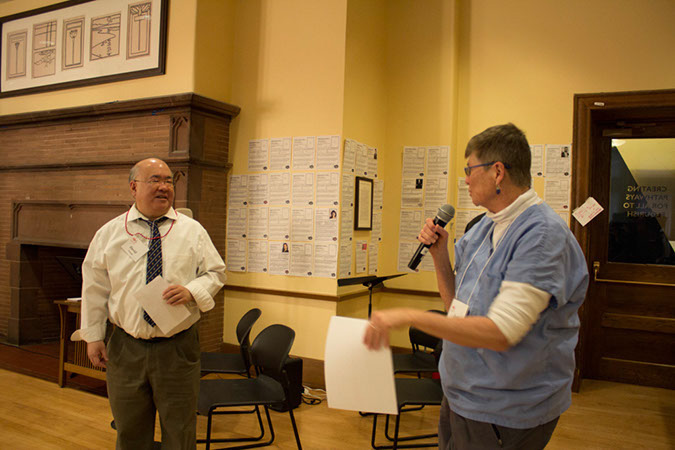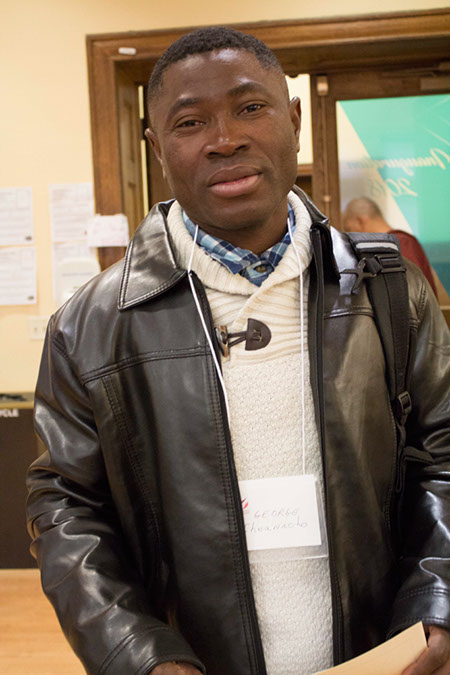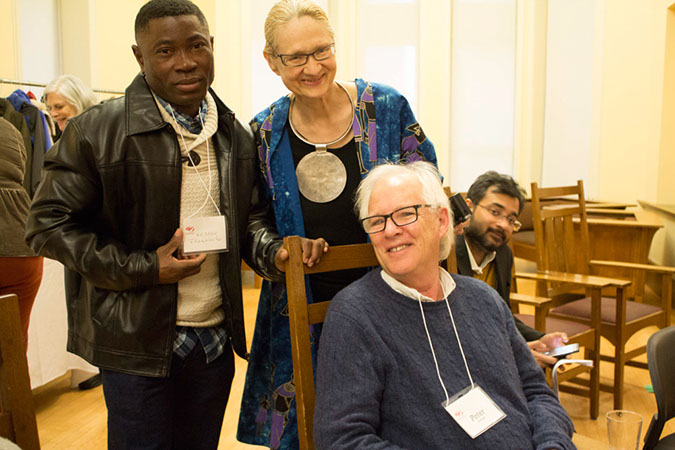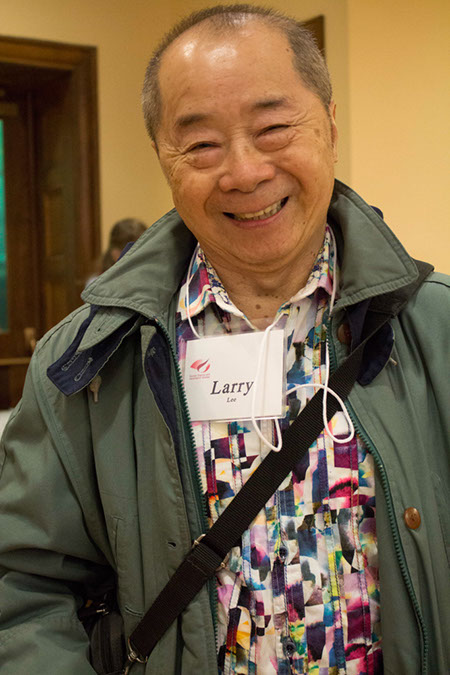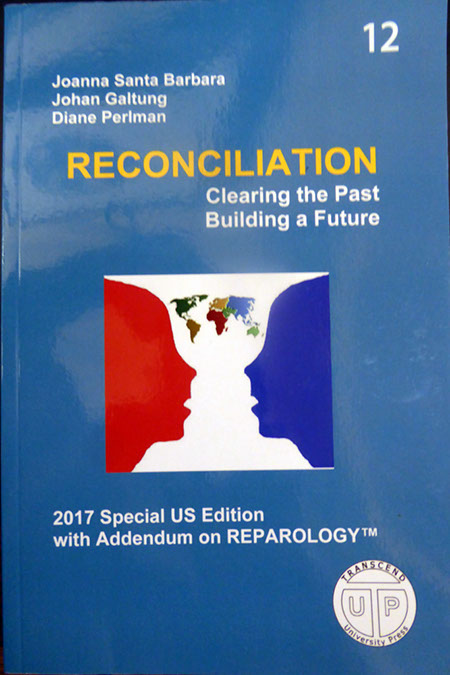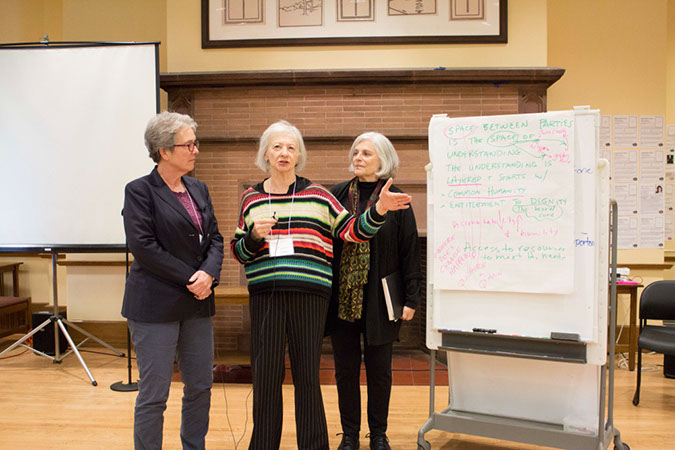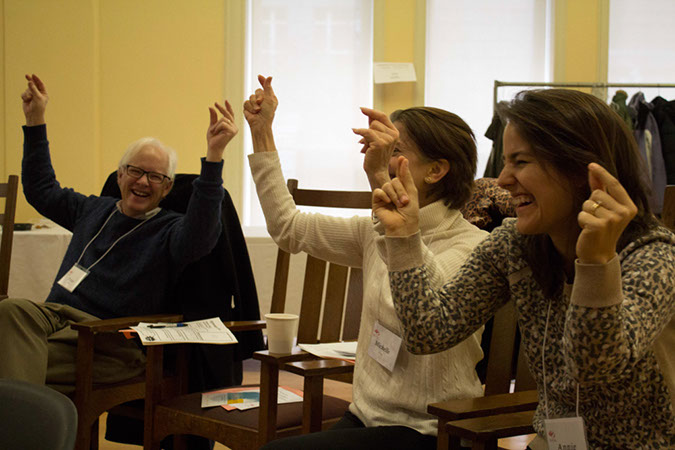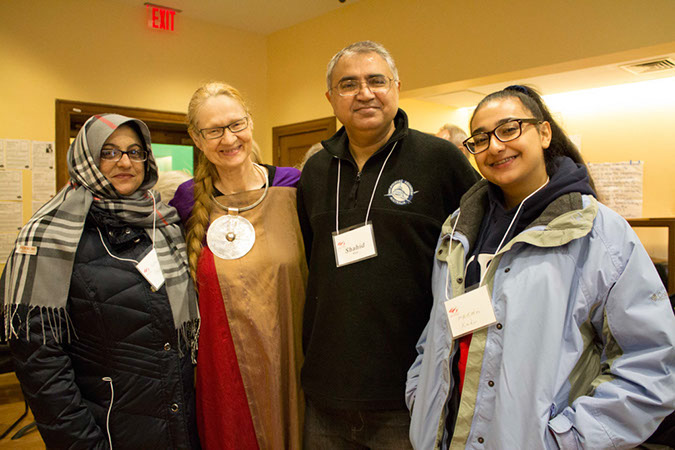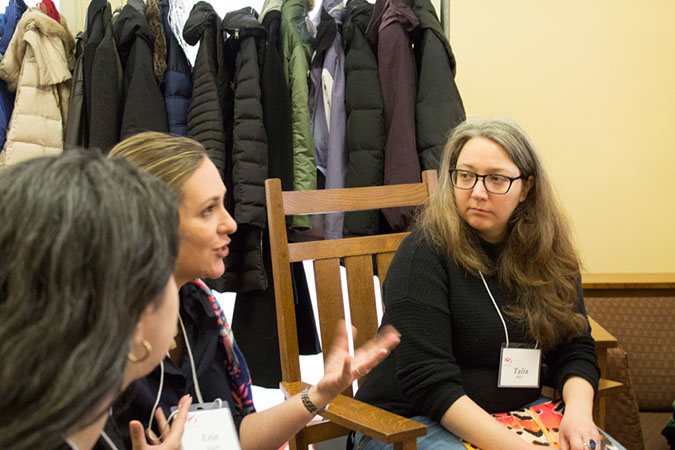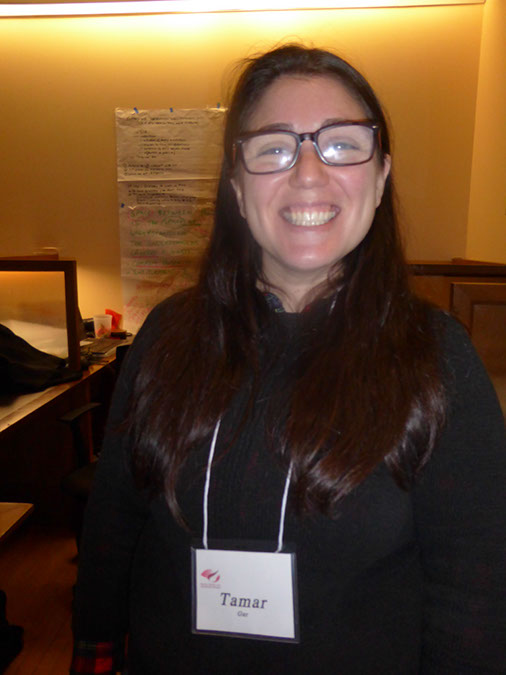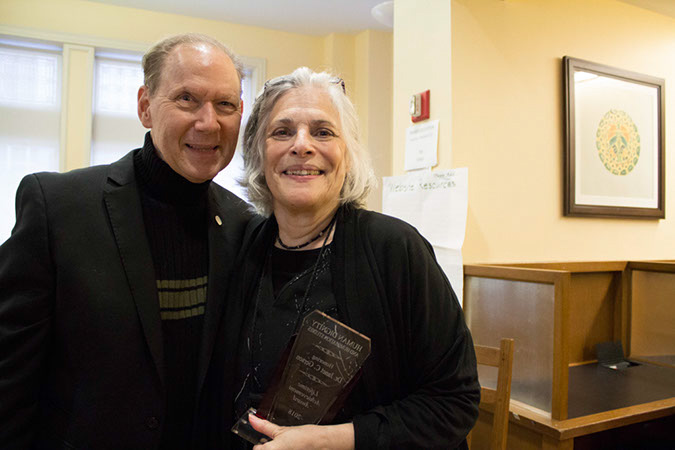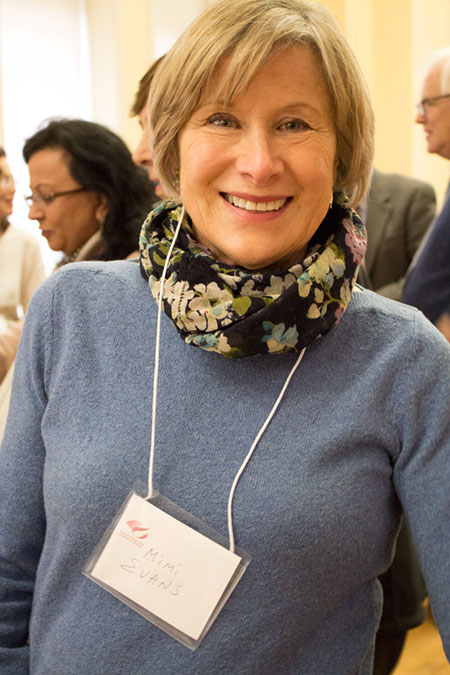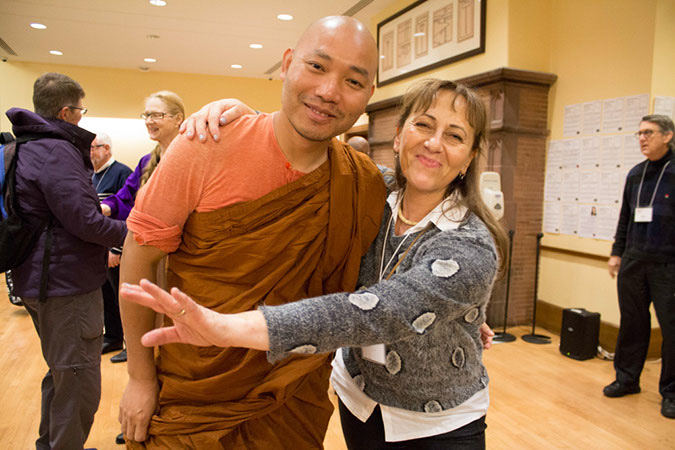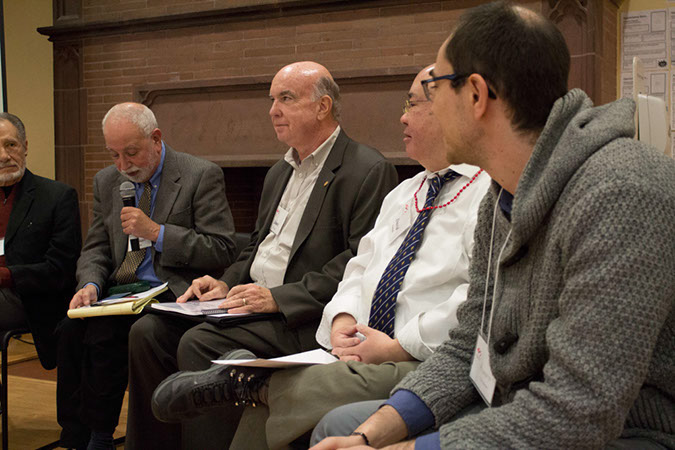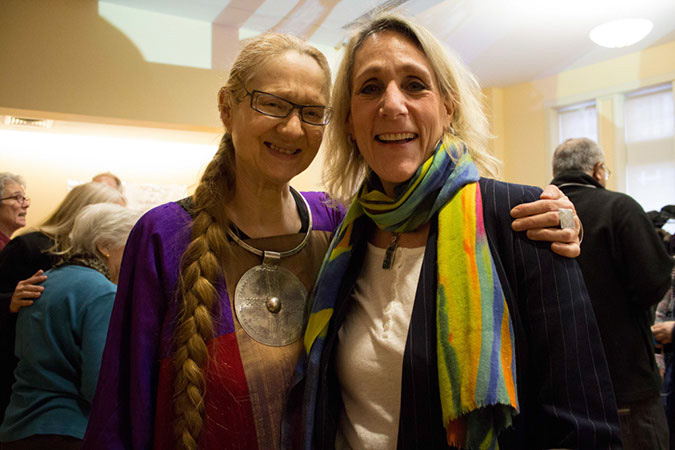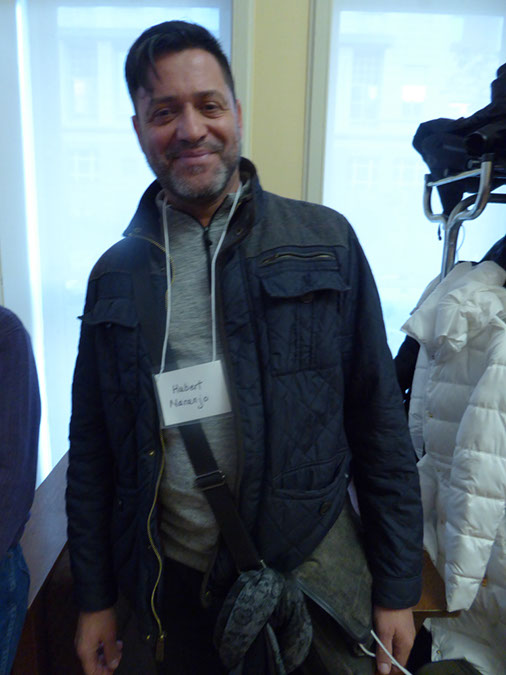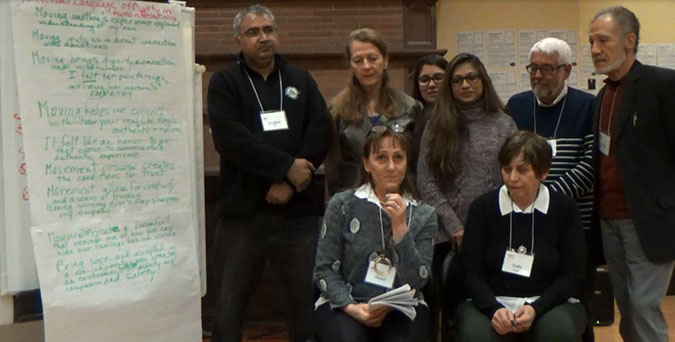2018 Workshop on Transforming Humiliation and Violent Conflict
"What Is the Language of Dignity?"
representing the
32nd Annual HumanDHS Conference
and the Fifteenth Workshop on Transforming Humiliation and Violent Conflict
December 6 – 7, 2018
hosted by
The Morton Deutsch International Center for Cooperation and Conflict Resolution
(MD-ICCCR)
Columbia University, Teachers College (TC), Everett Lounge
525 West 120th Street, New York City, NY 10027
subway 1, exit 116th Street
in cooperation with the World Dignity University initiative
This workshop series has two parts:
• Public Event
Thursday, December 6, 5 pm – 7 pm, TC, Everett Lounge
Open to everyone, free entrance, see the flyer
• Two-Day Workshop, Everett Lounge
Thursday and Friday, December 6 – 7, 10 am – 7 pm (registration at 9 am), TC
See the program
Only upon invitation, no registration fee, we always use a dignity economy approachWe cannot thank the participants enough for bringing such passion and inspiration to this workshop! You filled the room with dignity, rekindling and creating lifelong connections! Together, we made great steps toward nurturing a global dignity family! Thank you!
If you wish to participate in our workshops, please send an email to workshops@humiliationstudies.org. Please know that you are always invited to spend the entire workshop with us, so that true dignity-family-building can emerge. All our events are part of an ongoing effort to nurture a global dignity community. The workshop series follows a format of organic growth, and is thus different from mainstream conferences. In all our events, our aim is to create a community, rather than having an "audience" listen to "speakers."
All participants are always warmly invited to fill out our Appreciative Introduction form, print it out, and bring it with you.
There is no registration fee, we use to share minimal cost according to ability at the end.
At the entrance of Teachers College, please show your picture ID and print out your invitation or program, so that you can show it.
Please see what happened in this workshop:
• Short Workshop Program
• Public Event Flyer (see a Jpg version)
• Announcements of our News and a Dignity Press flyer
• Personal invitation letter
• Invitations to the workshop: "Dignity Letter" from June 15, 2018, from October 15, 2018, from November 4, 2018
• Newsletter Nr. 32, compiled subsequent to the workshop. You are warmly invited to contribute to it! (Please send your comments to us so that we can include them)
• This workshop is the fifteenth in a series that began in 2003: see the 2004, 2005, 2006, 2007, 2008, 2009, 2010, 2011, 2012, 2013, 2014, 2015, 2016, 2017 workshops, and a compilation of all NY workshopsAfter the workshop, several friends wrote articles inspired by the collaboration, deep dialogue, and mutual learning generated by all who participated in this special event:
• David Yamada, Minding the Workplace, “Dignitizing” Conferences and Workshops"
• Beth Boynton, Confident Voices in Healthcare, "Joining the Human Dignity and Humiliation Studies’ Education Team!"
• Brian D'Agostino, Psychohistory News, "Dignity, Humiliation, and Social Transformation"
• See also The Dignity Letter March 2019 – News from the Human Dignity and Humiliation Studies Community, sent out on March 4, 2019
Honorary Convenor since 2003 (he passed away in March 2017, and we honor his memory)
Morton Deutsch
First HumanDHS Lifetime Commitment Award Recipient


Linda Hartling and Evelin Lindner are the conveners of the annual workshops at Teachers College, Columbia University. Late Morton Deutsch convened the first workshop in 2003, and he has been its honorary convener until his passing in 2017. We wish to honor his memory by conducting this workshop also in the future.
(The photo with Morton Deutsch was taken in 2014. Please click on the picture above to it larger.)

Day Two

Linda Hartling's Collage
• Our Workshops on Humiliation and Violent Conflict are convened by The Morton Deutsch International Center for Cooperation and Conflict Resolution (MD-ICCCR), with Morton Deutsch, its late Director Emeritus, as our Honorary Convener since 2003,
on behalf of the Human Dignity and Humiliation Studies (HumanDHS) network and the World Dignity University (WDU) initiative (since 2011). MD-ICCCR was part of the Columbia University Conflict Resolution Network (CU-CRN), and, in 2009, also co-founder of the Advanced Consortium on Cooperation, Conflict, and Complexity (AC4). We are very grateful to our hosts!
• We thank Keerthana Hirudayakanth for so kindly arranging the venue for our workshop!
• To request disability-related accommodations and equipment, please contact OASID at oasid@tc.edu, (212) 678-3689, (212) 678-3853 TTY, (212) 678-3854 video phone.
Practical details
• Where to stay
• For all our workshops, we gratefully count on you to make your own transportation, accommodation, and visa arrangements.
• Please see here the subway map of NY.
• Please see Lodgings close to Columbia University, see particularly TC Guest Housing (Tel. +1 212 678-3235), International House, NYC (Tel. +1 212 316-8400), and Union Theological Seminary (Tel. +1 212 280-1313).
• See also AirBnB. We thank Erin Helfert for sending us this link. Thank you, dear Rosario Galvan, for writing to us on April 14, 2016: Here's another searcher for homestay, appartment rental: Roomorama. And see booking.com for hotel rooms also reflecting special deals for hostels and shared accommodations, perhaps better suited for younger students (in the search function just click on under $50 per night). They rent beds in shared rooms with shared bathrooms but also other options with private room and shared bathroom.
• A very quiet place to stay would be the Community of the Holy Spirit on West 113th Street.
• Tonya Hammer recommends Morningside Inn (very reasonable, but also very basic).
• Tomoko Ishii recommends On The Ave (more costly, but also less basic).
• The Milford Plaza Hotel is located in Broadway's Theater District (very reasonable).
• See furthermore the website for the NY City Hotel Trades Council, which will locate socially responsible hotels in the NY City area. We thank Floyd Rudmin for making us aware of this service.
• Please see also US SERVAS, hosting people for one to two nights. (This can be extended, but this is up to the host to extend, and the traveler to accept. Most NYC hosts do not host more than a week, except if the visitor is someone they really feel comfortable with and grow to like.)
• Please see also couchsurfing.com.
• Please see also craigslist.org.
• Please see furthermore Sara's New York Homestay, through which international students, visitors, interns or executives who come to New York City (this service exists also in Los Angeles, Paris, and London) for a short period of time (1 to 12 months) can find a place to stay (four weeks Manhattan cost ca. 1,500 USD, one week 900 USD, the cost is less outside Manhattan; when you write to them, convey greetings from Evelin: Evelin visited their office on November 19, 2007, and presented the HumanDHS initiative to Bernard Zagdanski, Sara’s husband).
• Some of our participants have used Aparthotels, such as Chelsmore Apartments, 205 West 15th Street, New York City, Tel. +1 212-924-7991. We thank David Bargal for this link.
• Green conference and reinventing organization
We strive to organize our conferences as "Green Conferences". Lynn King kindly advises us. We also thank Vegard Jordanger for making us aware of Frederic Laloux's work on Reinventing Organizations (2014).
• Please kindly note that...
• There is no registration fee for our conferences. To cover our expenses, we usually summarize the costs during the conference and invite participants to contribute according to their ability. This collaborative approach to financing allows us to keep the conference affordable for all.
• We like to get to know participants prior to our conferences and workshops, and prior to issuing an invitation.
• All our gatherings are by invitation only, please approach us so that we can include you and register you. Only our Public Events are open to everybody without registration.
• The Non-Public Parts of our gatherings have limited enrollment.
• Participants are encouraged to find their own sources of funding or economic support to participate in our conferences. We offer our nurturing work as our gift of love and care to you, and we would like to lovingly invite everybody to contribute to this gift economy. If you need funding for your travels and housing, please inquire in your country and your university about possibilities. See, among others, for the US, www.supportcenter.org and www.foundationscenter.org. The Weinstein International Fellowship program, inaugurated in 2008, provides opportunities for individuals from outside the United States to visit the U.S. to learn more about dispute resolution processes and practices and to pursue a project of their own design that serves to advance the resolution of disputes in their home countries.
• Participants are kindly asked to handle all of their travel arrangements and required documentation, including requests for visas, on their side. HumanDHS is a volunteer initiative and does not have the staff or resources to assist with visa requests.
• Permissions
During our conferences, we always ask all participants for their permission to have their pictures or videos posted on our website, however, if you change your mind later, either in total or for specific pictures/videos, please let us know! Thank you! Since we wish to walk the talk of dignity, it is very important for us to do our utmost in respecting everybody's privacy. We refrain from gathering written permissions from you during our conferences, since we value the building of mutual trust in relationships, and we also would like to refrain from contributing to an ever more bureaucratic and legalistic society.
• What happened in our previous conferences?
Please have a look at all our previous conferences and the newsletters written after these conferences.
Overview
Frame
• Rationale
• How We Go About
• Frame
• List of Conveners
Program
• Public Event (see flyer)
• Program of the Workshop (Day One & Day Two see the program)
Pre-Planned Dignity Dialogues - Dignilogues:
• Dignilogue 1: How are human dignity and humiliation relevant to destructive conflict? (Day One)
• Dignilogue 2: How can we cultivate dignity? (Day Two)
Co-Created Dignity Dialogues - Dignilogues:
• Co-Created Dignilogue Session #1 (Day One)
• Co-Created Dignilogue Session #2 (Day Two)
Participants and Convening Organizations
• Participants (in all New York City workshops so far)
• Details of the Convening Organizations
• Papers
• Pictures
We so much thank Anna Strout and many others, for taking such lovely photos!
The still photos come in several web galleries:
Thursday, December 6, 2018, Workshop:
• Thursday, December 6, 2018: Please click here to see all of Anna Strout's 204 photos of Day One
• Thursday, December 6, 2018: Please click here to see all Ritu Chopra's 18 photos of Day One
• Thursday, December 6, 2018: Please click here to see all of Rambabu Talluri's 22 photos of Day One
• Thursday, December 6, 2018: Please click here to see all of Evelin Lindner's 54 photos of Day One
Thursday, December 6, 2018, Public Event:
• Thursday, December 6, 2018: Please click here to see all of Anna Strout's 116 photos of the Public Event
Friday, December 7, 2018, Workshop:
• Friday, December 7, 2018: Please click here to see all of Anna Strout's 297 photos of Day Two
• Friday, December 7, 2018: Please click here to see all of Evelin Lindner's 80 photos of Day Two
• Friday, December 7, 2018: Please click here to see 9 of Anna Strout's photos of Linda and Evelin on Day Two
• Friday, December 7, 2018: Please click here to see the Dignilogue Posters
Thank you so much, dear Rambabu Talluri for doing such wonderful video recording!
Day One:
• 01 Soprano Hannah Voss Performs
• 02 Linda Hartling Welcomes All Participants
• 03 Danielle Coon Welcomes All Participants
• 04 Linda Hartling Introduces the Appreciative Frame of the Workshop
• 05 Phil Brown Invites to Get to Know Each Other
• 06 Introduction Rounds
• 07 Classical Indian Singer Yesupadam Bobbili Performs
• 08 Tony Gaskew Introduces Himself
• 09 Rick Slaven, Director of Dignifunding
• 10 Evelin Lindner Brings Greetings from the 31st Dignity Conference in Egypt in September 2018
• 11 David Yamada Introduces the Dignilogue Format
• 12 Pre-Planned Dignilogue 1: Michael Perlin
• 13 Pre-Planned Dignilogue 1: Claudia Cohen
• 14 Pre-Planned Dignilogue 1: Janet Gerson
• 15 Pre-Planned Dignilogue 1: Daniel Rothbart
• 16 Pre-Planned Dignilogue 1: Stephen Post
• 17 Pre-Planned Dignilogue 1: Tony Gaskew
• 18 Pre-Planned Dignilogue 1: Anastasia Taskin Reflects on Stephen Post's Contribution
• 19 Soprano Hannah Voss Performs
• 20 Linda Hartling Invites Appreciative Introductions
• 21 Diane Perlman Explains her Gift
• 22 We Always Ask for Permission to Post Photos and Videos
• 23 Linda Hartling Invites Dignity Feedback
• 24 Philip Brown Invites into Co-Created Dignilogues
• 25 WDU Message: "Therapeutic Jurisprudence"
• 26 WDU Message: "Relational Dignity" (unfortunately the recording failed)
• 27 WDU Message: "Stories of Humiliation Reframed as Stories of Dignity"
• 28 WDU Message: "Love, Dignity, and the Deeply Forgetful"
• 29 WDU Message: "Explore Compassion-Motivated Practices"
• 30 Soprano Hanna Voss Performs
• 31 Classical Indian Singer Yesupadam Bobbili Performs
• 32 Soprano Hannah Voss Performs
Public Event:
• 33 Fred Ellis Performs with His Students
• 34 Rick Slaven: "The Language of Leading with Dignity"
• 35 Honoring Richard Slaven, Ph.D.
• 36 All Sing "Some Say Love"
• 37 Dignilogue Panel: "The Language of Leading with Dignity"
• 38 Flutist Suki Rae Introduces Herself
• 39 Flutist Suki Rae Performs
• 40 Flutist Suki Rae Performs and Participants Dance
• 41 Flutist Suki Rae Performs and Participants Dance (Chipamong Chowdhury's recording)
Day Two:
• 42 Classical Indian Singer Yesupadam Bobbili Performs
• 43 New Arrivals Introduce Themselves
• 44 Linda Hartling Welcomes All Participants and Shares Practical Details
• 45 Michael Britton's Don Klein Celebration Lecture
• 46 Rick Slaven, Director of Dignifunding
• 47 Soprano Hannah Voss Performs
• 48 Janet Gerson Receives the Human Dignity (Half!) Lifetime Award
• 49 Judit Revesz Introduces Carmen Alejandro
• 50 Guitarist Carmen Alejandro Performs
• 51 Honoring Hannah and Angelyn Voss
• 52 Honoring Yesupadam Bobbili
• 53 Honoring Careholders
• 54 Honoring Evelin Lindner (see also December 5)
• 55 David Yamada Invites into Co-Created Dignilogues
• 56 WDU Message: "Forgiveness"
• 57 WDU Message: "Every Person Has Worth - Because They Are Alive"
(unfortunately the audio failed after Amy Silveman's introduction)
• 58 WDU Message: "Law and Justice"
• 59 WDU Message: "Dalits in India"
• 60 WDU Message: "Nonverbal Language of Dignity and Human Relations"
• 61 WDU Message: "Improv Theater"
"Messages to the World" for the World Dignity University (WDU) Initiative:
• Evelin Lindner Explains the Concept of the "Dignivideos - Messages to the World" (2017)
• Michael Britton Explains the Concept of the "Dignivideos - Messages to the World" (2017)
Day One, December 6, 2018
• 25 WDU Message: "Therapeutic Jurisprudence"
• 26 WDU Message: "Relational Dignity" (unfortunately the recording failed)
• 27 WDU Message: "Stories of Humiliation Reframed as Stories of Dignity"
• 28 WDU Message: "Love, Dignity, and the Deeply Forgetful"
• 29 WDU Message: "Explore Compassion-Motivated Practices"
Day Two, December 7, 2018
• 56 WDU Message: "Forgiveness"
• 57 WDU Message: "Every Person Has Worth - Because They Are Alive"
(unfortunately the audio failed after Amy Silveman's introduction)
• 58 WDU Message: "Law and Justice"
• 59 WDU Message: "Dalits in India"
• 60 WDU Message: "Nonverbal Language of Dignity and Human Relations"
• 61 WDU Message: "Improv Theater"
• Newsletters
• Compilation of all New York City workshops
• Workshop Notes & Documentation
Rationale, Methodology, and Frame
Rationale
This workshop series is part of a larger process. Each workshop is much more than a stand-alone event. It is part of the overall mission of our global dignity movement, which is to create an atmosphere in which people can meet on a plane of mutual friendship and equality in dignity. The workshop invites its participants to experiment with creating a new culture of global cohesion and togetherness, and to nurture a global family of dignity, a family that truly acts like a good family should act and protects and cherishes our unity in diversity. The workshop invites into enlarging and transcending concepts such private versus public, or family/friends/good neighbors versus "bad neighbors" (or even "enemies"), as well as concepts such as life mission versus job/hobby..
Given the current context of the field of international conflict, the impact of emotions on conflict has become one of the most important questions worldwide. However, there are only scattered publications in the research and applied literature that would address issues on conflict and emotion directly, as well as their relations and their impact on public policy.
The first one-day meeting was held at Teachers College, Columbia University, in 2002, convened by Morton Deutsch personally, the first two-day workshop in 2004, hosted by the Columbia University's Conflict Resolution Network (CU-CRN, since 2009, AC4 stepped into the place of CU-CRN), with special help from SIPA – Center for International Conflict Resolution (CICR) and The Morton Deutsch International Center for Cooperation and Conflict Resolution (MD-ICCCR)
Since 2004, CICR on behalf of CU-CRN and later AC4, together with the Human Dignity and Humiliation Studies (HumanDHS) network and, since 2011, also the World Dignity University (WDU) initiative, invites selected groups of scholars, counselors, conflict resolution practitioners, mediators, and teachers among other professions for a two-day workshop every year to explore issues of conflict and emotions and its application to actual negotiations and diplomacy. The aim is to particularly probe the role of the notion of humiliation from the two different angles of conflict and emotion.
The workshops are envisaged as a learning community gathering, interactive and highly participatory. The purpose is to create an open space to identify and sharpen our understanding of the discourse and debate on emotion and conflict and the role that might, or might not be played by humiliation within this field. We hope to be able to continue this effort in follow-up workshops in the future.
We see humiliation as entry point into broader analysis and not as "single interest scholarship." We are aware that most participants focus on other aspects than humiliation in their work and have not thought about humiliation much, or even at all. We do not expect anybody to do so beforehand. We encourage that everybody comes with his/her background, his/her theoretical concepts and tools, and that we, during the conference, reflect together. We invite everybody to use their focus and give a thought to whether the notion of humiliation could be enriching, or not, and if yes, in what way. We warmly invite diverging and dissenting views.
How We Go About
In our conferences, we choose a dialogical methodology that stresses interaction and participation, because we wish to create an atmosphere of openness and respectful inquiry through "dignity dialogues" or dignilogues and, when appropriate, the use of Open Space Technology. We believe that notions such as dignity and respect for equal dignity are important not only for conflict resolution, but also for conferences such as our workshops. The name Human Dignity and Humiliation Studies attempts to express this. We wish to strive for consistency between what we think are important values for conflict resolution, and the way we conduct our work and our conferences.
We believe in "waging good conflict" (Jean Baker Miller). We believe that diverging opinions and perspectives need to be expressed and not avoided, because diversity enriches. However, diversity only enriches if embedded into mutual connection and appreciation. If not harnessed lovingly and caringly, diversity has the potential to divide, create hostility, and foster hatred and even violence. In the spirit of our vision, we, the HumanDHS network, wish therefore to avoid the latter and foster an atmosphere of common ground and mutually caring connections as a space for the safe expression of even the deepest differences and disagreements, and the toughest questions of humiliation, trauma, and injustice.
Every dignilogue is being opened by brief remarks by each participant to present their entry points into the inquiry. In order to facilitate feedback, we wish to make available a brief synopsis of 1 to 4 pages, preferably with references, from each participant, prior to the workshop through this site so that all participants can meet virtually before meeting in person. Longer papers are welcome as well both prior and subsequent to our workshops, not least for the envisaged publications of the results of our conferences. Please notify us, if you wish to submit any of your papers also as a book chapter or as a journal article in our Journal of Human Dignity and Humiliation Studies.
All participants are warmly invited to send in their papers as soon as they can. We would be grateful if you could help us by formatting your contribution as follows:
1. Title: bold and in a large font.
2. The author's name under the title, proceded by a copyright sign ![]() .
.
3. In case the text is longer than one page: A footer for the name of the author, and a header for the title and the page number (in Word, you can use View > Header and Footer > Page Setup > Different first page, etc.).
4. Spacing: Single-spacing.
5.
For non-natural English speakers who need support to make a text readable, please let us know and we try to find help.
5. The final Word document needs to be transformed into a Pdf file (use, for example, convert.neevia.com), and given a name. Please use your family name, and then identify the conference, in case of the 2008 NY workshop, this would read as follows: "FamilynameNY08meeting."
6. Please send us both you Word and Pdf files. Thank you!
Peace Linguist Francisco Gomes de Matos commented on this format as follows (May 2, 2012): "It enhances RELATIONAL DIGNITY. Everyone will make the most of such dignifyingly used time! A great humanizing, interactive format: a little bit of MONOlogue, followed by much DIALOGUE, will help create DIGNILOGUE."
Frame
by Linda M. Hartling, Ph.D., Director of Human Dignity and Humiliation Studies (until 2008 Associate Director of the Jean Baker Miller Training Institute at Wellesley College in Boston, USA)
In our conferences we aim at creating a humiliation-free, collaborative learning environment characterized by mutual respect, mutual empathy, and openness to difference. The perspective of "appreciative enquiry" is a useful frame of our work. Our HumanDHS efforts are not just about the work we do together, but also about HOW WE WORK TOGETHER. At appropriate points during our conferences, for example at the end of each day, we take a moment to reflect on the practices observed that contributed to an appreciative/humiliation-free learning experience.
It is important to emphasize that an appreciative approach is not about expecting people to agree. In fact, differences of opinion enrich the conversation and deepen people's understanding of ideas. This could be conceptualized as "waging good conflict" (Jean Baker Miller), which means practicing radical respect for differences and being open to a variety of perspectives and engaging others without contempt or rankism. As we have seen in many fields, contempt and rankism drain energy away from the important work that needs to be done. Most people only know "conflict" as a form of war within a win/lose frame. "Waging good conflict," on the other side, is about being empathic and respectful, making room for authenticity, creating clarity, and growth.
Please see also the following background material, mainly created by Linda Hartling:
• A Summary of Our Dignilogue Format for you to download
• An Appreciative Frame: Beginning a Dialogue on Human Dignity and Humiliation, written by Linda Hartling in 2005
• Appreciative Facilitation: Hints for Dignilogue Moderators, written by Judith Thompson in February 2006 to support the moderators of our workshops
• Buddhist Teachings on Right Speech, kindly provided to us by Thomas Daffern in 2006, relating to our quest for appreciative enquiry, caring and being
• Please see also these videos on our Appreciative Frame, created by Linda Hartling:
- Appreciative Enquiry 1, a video that was recorded on October 30, 2011, in Portland, Oregon, USA, by Evelin Lindner, for the World Dignity University initiative.
- Appreciative Enquiry 2, a video that was uploaded onto YouTube on August 11, 2012, in preparation of the 19th Annual Conference of Human Dignity and Humiliation Studies, August 27 – 30, 2012, in Oslo, Norway.
- Our Appreciative Frame 3, a video created in December 2014 (see also Pdf), for the 2014 Workshop on Transforming Humiliation and Violent Conflict, in New York City, December 4 – 5, 2014.
- Appreciative Enquiry 4, a video recorded by Linda Hartling on May 27, 2015, in Portland, Oregon, USA, for the 25th Annual Conference of Human Dignity and Humiliation Studies, in Kigali, Rwanda, June 2 – 5, 2015.
- Appreciative Frame, by Linda Hartling on December 8, 2016, at the 2016 Workshop on Transforming Humiliation and Violent Conflict, in New York City, December 8 – 9, 2016.
• Dignilogue Tips and Dynamic Dignilogue List, created by Linda Hartling on October 10, 2015, for the 2015 Workshop on Transforming Humiliation and Violent Conflict, in New York City, December 3 – 4, 2015.
List of Conveners
Honorary Convener 2003 – 2017: Morton Deutsch (February 4, 1920 – March 13, 2017), E. L. Thorndike Professor Emeritus of Psychology and Education, and Director Emeritus of The Morton Deutsch International Center for Cooperation and Conflict Resolution (MD-ICCCR), Teachers College, Columbia University
Morton Deutsch has been one of the world's most respected scholars and the founder of The Morton Deutsch International Center for Cooperation and Conflict Resolution (MD-ICCCR). MD-ICCCR was part of the Columbia University Conflict Resolution Network (CU-CRN), and in 2009 co-founded the Advanced Consortium on Cooperation, Conflict, and Complexity (AC4). Professor Deutsch has been widely honored for his scientific contributions involving research on cooperation and competition, social justice, group dynamics, and conflict resolution. He has published extensively and is well known for his pioneering studies in intergroup relations, social conformity, and the social psychology of justice. His books include: Interracial Housing (1951); Theories in Social Psychology (1965); The Resolution of Conflict (1973); Distributive Justice (1985); and The Handbook of Conflict Resolution: Theory and Practice (2000, 2nd edition 2006). Please note, in particular, Morton Deutsch's pledge titled Imagine a Global Human Community and its progress.
Morton Deutsch founded this workshop series in 2003 and has been its Honorary Convener until his passing in 2017. We will honor his memory by conducting this workshop also in the future. He has been a Member of the HumanDHS Global Advisory Board since the inception of our dignity work in 2001, and, in 2014, he accepted, "with delight," our invitation to be our HumanDHS Board of Directors Honorary Lifetime Member. Morton Deutsch has also been the first recipient of the HumanDHS Lifetime Achievement Award, which he received at the 2009 Workshop on Transforming Humiliation and Violent Conflict. Furthermore, Morton Deutsch has been a Founding Member of the World Dignity University initiative.
Linda M. Hartling, Ph.D., Social Psychologist, organizer of the HumanDHS conferences, in support of the local conveners
Linda M. Hartling, Ph.D., is the recipient of the 2015 Human Dignity (Half!) Lifetime Commitment Award.
She is the Director of Human Dignity and Humiliation Studies (HumanDHS) and contributes to the leadership and development of workshops, conferences, Dignity Press publications, and the World Dignity University initiative. She works in daily collaboration with HumanDHS Founding President Evelin Lindner and is the orchestrator and key creator of the Dignity Letter. She is also a member of the HumanDHS Global Advisory Board, HumanDHS Global Core Team, HumanDHS Global Coordinating Team, HumanDHS Research Team, and HumanDHS Education Team.
Linda Hartling's husband Richard Slaven, formerly Brandeis University, Massachusetts, U.S.A., is the Director of HumanDHS Dignifunding. Richard Slaven is a Member of the Board of Directors of HumanDHS, he is a member of the HumanDHS Global Advisory Board and a Member of the HumanDHS Planning Committee. He is the recipient of the 2014 HumanDHS Lifetime Commitment Award.
Prior to the founding of HumanDHS, Linda Hartling was the Associate Director the Jean Baker Miller Training Institute (JBMTI) at the Stone Center, which was part of the Wellesley Centers for Women at Wellesley College in Massachusetts. She worked closely with Jean Baker Miller, MD, and other colleagues on the development of Relational-Cultural Theory. She holds a doctoral degree in clinical/community psychology and she developed the first scale to assess the internal experience of humiliation in 1996, which has been translated into many languages. In addition, she has published papers and chapters on resilience, substance abuse prevention, shame and humiliation, relational practice in the workplace, and Relational-Cultural Theory. [read more]
Please see:
• Humiliation: Real Pain, A Pathway to Violence, the draft of Linda's paper for Round Table 2 of our 2005 Workshop on Humiliation and Violent Conflict, Columbia University, New York City.
• Humiliation: Assessing the Impact of Derision, Degradation, and Debasement, first published in The Journal of Primary Prevention, 19(4): 259-278, co-authored with T. Luchetta, 1999.
• Shame and Humiliation: From Isolation to Relational Transformation, the Jean Baker Miller Training Institute (JBMIT), Wellesley Centers for Women, Wellesley College No. 88, Wellesley, MA 02481, co-authored with Wendy Rosen, Maureen Walker, Judith V. Jordan, 2000.
• Humiliation and Assistance: Telling the Truth About Power, Telling a New Story, paper prepared for the 5th Annual Conference of Human Dignity and Humiliation Studies 'Beyond Humiliation: Encouraging Human Dignity in the Lives and Work of All People', in Berlin, 15th -17th September, 2005.
• Our Appreciative Frame, created on 12th August 2012 for our 2012 Norway Conference
• Our Open Space Dignilogue Format, created on August 12, 2012 for our 2012 Norway Conference
• Our Appreciative Frame, created in December 2014 for our 2014 New York Workshop (Pdf)
• Appreciative Enquiry 4, a video that was recorded on May 27, 2015, in Portland, Oregon, USA, by Linda Hartling, for the 25th Annual Conference of Human Dignity and Humiliation Studies, in Kigali, Rwanda, June 2 – 5, 2015.
• Appreciative Frame shared on December 8, 2016, at the 2016 Workshop on Transforming Humiliation and Violent Conflict, in New York City, December 8 – 9, 2016.
• Dignilogue Tips and Dynamic Dignilogue List, created by Linda Hartling on October 10, 2015, for the 2015 Workshop on Transforming Humiliation and Violent Conflict, in New York City, December 3 – 4, 2015.
• Mini-Documentary of the Annual Human Dignity and Humiliation Studies Workshop on Transforming Humiliation and Violent Conflict "The Globalization of Dignity," December 8 - 9, 2016
Evelin Gerda Lindner, Medical Doctor, Clinical and Social Psychologist, Ph.D. (Dr. med.), Ph.D. (Dr. psychol.), organizer of the HumanDHS conferences, in supporting of the local conveners
Evelin Gerda Lindner is the Founding President of the Human Dignity and Humiliation Studies (HumanDHS) network and initiator of the World Dignity University initiative. She is a transdisciplinary social scientist and humanist who holds two Ph.D.s, one in medicine and one in psychology. In 1996, she designed a research project on the concept of humiliation and its role in genocide and war. German history served as starting point. She is the recipient of the 2006 SBAP Award, the 2009 "Prisoner’s Testament" Peace Award, the 2014 HumanDHS Lifetime Award, and she has been nominated for the Nobel Peace Prize in 2015, 2016, and 2017. She is affiliated with the Columbia University Conflict Resolution Network (CU-CRN), which was superseded, in 2009, by the Advanced Consortium on Cooperation, Conflict, and Complexity (AC4), at Columbia University, New York City. She is also affiliated with the University of Oslo, Norway, with its Norwegian Centre for Human Rights, and with its Department of Psychology (folk.uio.no/evelinl/), and, furthermore, with the Maison des Sciences de l'Homme in Paris. Lindner is teaching globally, including in South East Asia, the Middle East, Australia, Africa, and other places globally. [read more]
Please see:
• Interview with Evelin Lindner - Challenges of our Time; Learning to Connect, December 8, 2016
• Mini-Documentary of the Annual Human Dignity and Humiliation Studies Workshop on Transforming Humiliation and Violent Conflict "The Globalization of Dignity," December 8 - 9, 2016
Jean-Marie Guéhenno, Aldo Civico, Ph.D., Andrea Bartoli, Ph.D.
Andrea Bartoli inspired this workshop series and helped design it in 2003. He was then the Director of the Center for International Conflict Resolution (CICR) at the School of International and Public Affairs, Columbia University, and Chairman of the Columbia University Conflict Resolution Network (CU-CRN). Andrea Bartoli is a Member of the HumanDHS Global Advisory Board since its inception. Also his successor, Aldo Civico, kindly supported this workshop, as did his successor,
Jean-Marie Guéhenno, who became the President of the International Crisis Group in 2014. We wish to give special thanks to all three for their kind support. Since 2015, CIRC is dormant and the Arnold A. Saltzman Institute of War and Peace Studies (SIWPS) at the School of International and Public Affairs offers courses in specialization in conflict resolution (ICR Concentration).
In 2009, the Advanced Consortium on Cooperation, Conflict, and Complexity (AC4) was co-founded by MC-ICCCR.
We also wish to give special thanks to Beth Fisher-Yoshida, Academic Director of a Master of Science in Negotiation and Conflict Resolution at The School of Professional Studies (former School of Continuing Education) at Columbia University, for her support since 2001.
Tonya R. Hammer, Ph.D.
Tonya R. Hammer is also a Member of the Global Coordinating Team, and the HumanDHS Research Team.
Since 2013, Tonya is Assistant Professor of Counseling at Oklahoma State University-Tulsa. Prior to that, from August 2008, Tonya held the position of Assistant Professor with the University of Houston-Clear Lake, in Texas, U.S.A. She wrote her doctoral dissertation at the Counselor Education and Supervision department at St. Mary's University, San Antonio, Texas. Her Masters degree in Psychology and Counseling is from the University of Mary-Hardin Baylor in Belton, Texas and her bachelor's degree is in English from the University of Texas, Arlington. [read more]
Program
Introductory questions asked by Bonnie Selterman, November 11, 2018:
What is dignity? If it’s inherent, then it’s inviolable. What are the various interpretations of the term ‘dignity’? In what way do these interpretations differ in their goals sought, and in the problems encountered with each of these? What about the tension between local interpretations of dignity and a prospective universal interpretation? Who should decide? What about the tension between dignity of the individual and dignity of the group – as a species that evolved in groups? What about those glaring ‘test cases’? When we think of abortion, we find ‘dignity dilemma’ of the dignity of fetal life versus dignity encompassing the autonomy of the woman’s reproductive self. Who shall go on the ‘lifeboat’ if the lifeboat can only accommodate a limited number of people and the survival of the community/society/species is at stake? Does this not indicate that, in fact, we may have to value the lives of different human beings differently, thus acknowledging dignity cannot always be conferred equally? Who decides, when all cannot be saved? Who decides who the deciders shall be? What about the resistance we encounter when we promote the idea that everyone has dignity, when people roll their eyes, or worse? How do we all benefit from promoting this idea? If the idea of inherent dignity is naïve, is it not more naïve to think we can continue on our current destructive path? Or, what if both is naïve – continuing as we are, or imagining equal dignity for all – then why should now people seek dignity by simply maximizing their own most comfortable existence in their short precarious time allotted alive?
Linda Hartling crafted the following questions, November 12, 2018:
What is the language of dignity?
Is it...
• a language of listening, especially listening others into voice?
• a language of relationships and relational awareness?
• a language that includes silence?
• a language of words and deeds?
• a language of inclusivity?
• a language of working wisely with conflict?
• a language that cultivates authenticity?
• a language of many languages?
• a language that generates seeds of creativity?
• a language that has roots in all languages... (do we need a seed library of dignity)?
• a language carried in poetry, art, music, dance, artistic expression, etc.?
• a language that provides an inoculation and antidote to humiliation?
• a language that restores and replenishes the health of people and the planet?
• a language that encourages democracy?
• a language necessary to move us toward egalization?
• a language that prevents, reduces, and defuses hostility?
• a language for everybody?
Day One, Thursday, December 6, 2018, Columbia University, Teachers College (TC), Everett Lounge,
just beside the main TC entrance and the John Dewey bust
just beside the main TC entrance and the John Dewey bust

We so much thank Anna Strout and many others, for taking such lovely photos!
The still photos come in several web galleries:
• Thursday, December 6, 2018: Please click here to see all of Anna Strout's 204 photos of Day One
• Thursday, December 6, 2018: Please click here to see all Ritu Chopra's 18 photos of Day One
• Thursday, December 6, 2018: Please click here to see all of Rambabu Talluri's 22 photos of Day One
• Thursday, December 6, 2018: Please click here to see all of Evelin Lindner's 54 photos of Day One
9.00 am Registration, Meeting, Greeting, Listening, Learning, and Digniloging
(Careholders meet at 8.00 am)
We have no words to thank the new President of Teachers College, Thomas R. Bailey, together with Portia Williams, Joe Levine, Peter Coleman, Danielle Coon, Charlott Macek, and Keerthana Hirudayakanth, also together with our friends from media, facilities, and security at Teachers College, Kofi Asare, Jasmine Ortiz, Hua-Chu Yen, Kevin Waldron, James Kearney, Sandra Afflick, Jennifer Govan, to name only a few of those valued friends at Teachers College who are so kind to make our workshop possible! What a gift Teachers College gives to the world by hosting a global dignity workshop!




Rick Slaven always courageously steps up to manage everything from our registration table to dignifunding! He was joined by Bonnie Selterman, who most lovingly took over whenever needed! And we so much thank also Angelyn Voss and Bhante Revata Chipamong Chowdhury for joining the effort!

Thank you, dear Natasha King from Media Services, for your loving support!
Instead of "shareholders" we have Careholders!
This was the third workshop with Dignigardeners, who kindly hold, guard, and protect the most important goal of our work, namely, to place relationships first and nurture them so that diversity of opinions and conflict can enrich, rather than tear the fabric of the relationships apart. Please see an Introduction into the Dignilogue Sessions Format, created by Linda Hartling on August 12, 2012, and read more about the Dignilogue format and what it entails. See also Linda's Dignilogue Tips and Dynamic Dignilogue List, created on October 10, 2015, for last year's workshop, and Gabriela Saab's Dignigardener Tips created on December 6, 2016. See, furthermore, our reflections on Appreciative Nurturing.


We thank everybody for helping us with taking photos and videos! Our dear Anna Strout from Teachers College always comes by to take the most lovely photos!




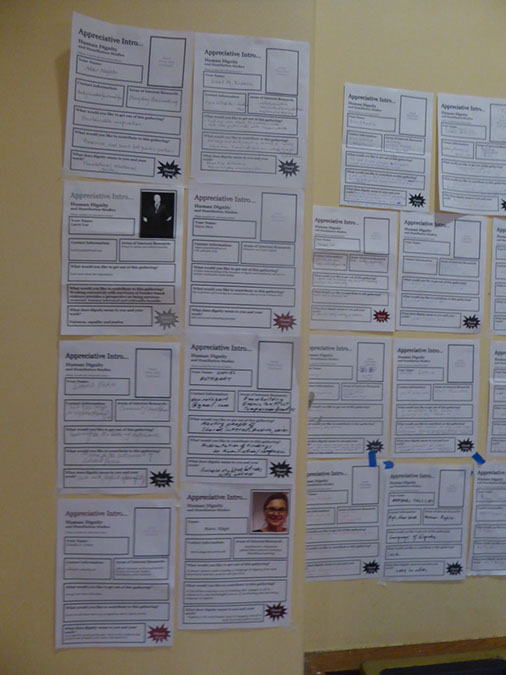
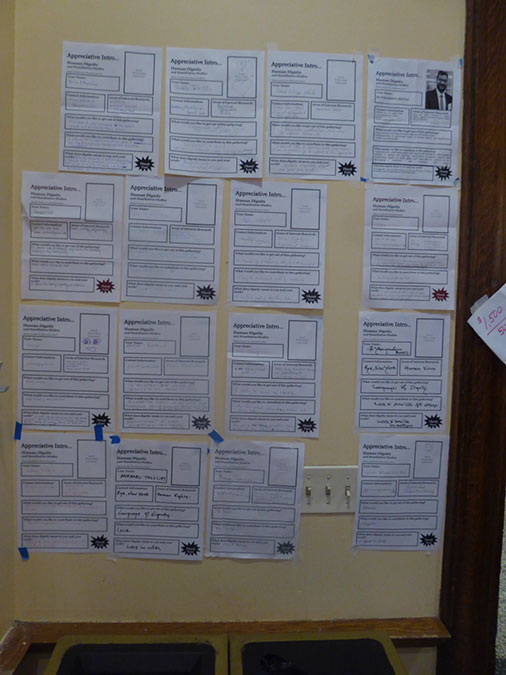
For all our conferences, our participants are invited to fill out our Appreciative Introduction form, print it out, and bring it with them.
10.00 am Linda Hartling, Director of the Human Dignity and Humiliation Studies (HumanDHS) network, Welcomed All Participants

• Thursday, December 6, 2018: Please click here to see all of Anna Strout's 204 photos of Day One
• Thursday, December 6, 2018: Please click here to see all Ritu Chopra's 18 photos of Day One
• Thursday, December 6, 2018: Please click here to see all of Rambabu Talluri's 22 photos of Day One
• Thursday, December 6, 2018: Please click here to see all of Evelin Lindner's 54 photos of Day One
Wonderful musical interludes by vocalist Hannah Voss (Video of Interlude 1)
10.10 am Danielle Coon, Associate Director of the Morton Deutsch International Center for Cooperation and Conflict Resolution (MD-ICCCR), Welcomed All Participants

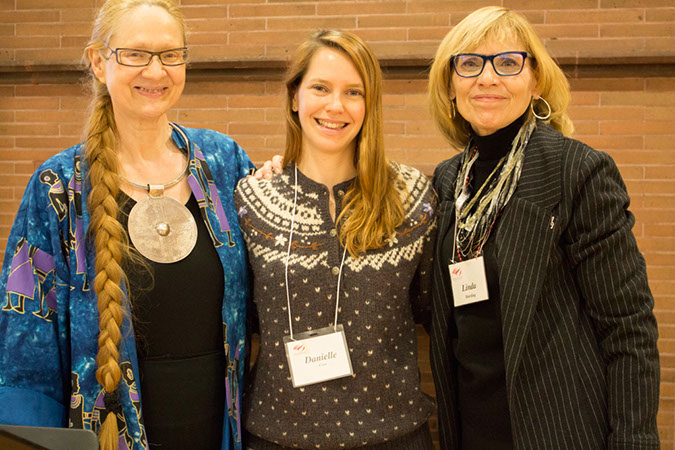

• Thursday, December 6, 2018: Please click here to see all of Anna Strout's 204 photos of Day One
• Thursday, December 6, 2018: Please click here to see all Ritu Chopra's 18 photos of Day One
• Thursday, December 6, 2018: Please click here to see all of Rambabu Talluri's 22 photos of Day One
• Thursday, December 6, 2018: Please click here to see all of Evelin Lindner's 54 photos of Day One
Building a World of Dignifying Dialogue: Introducing the Appreciative Frame of our Dignity Approach (2016 Video | 2014 Pdf)
Linda M. Hartling, Ph.D., Director of the Human Dignity and Humiliation Studies network.
Linda usually sets the frame of our workshops and conferences within "Appreciative Enquiry" that takes the best from the concept of debate, and dignifies it by placing relationships first. We create a list of agreed upon norms having to do with the nature and tone of our dialogue.
Donald Klein used to support Linda in her efforts. To our immense sadness, our beloved Don passed away in June 2007. We are still heartbroken. We commemorate his memory with great love. Linda continues to keep our workshop together with her untiring caring interventions, while we remember Don's caring wisdom that always used to save our conferences in crucial moments!
It is important to note that our appreciative frame is a HumanDHS-defined version of AI. We emphasize "waging good conflict" (Jean Baker Miller). We believe that diverging opinions and perspectives need to be expressed and not avoided, because diversity enriches. However, diversity only enriches if embedded into mutual connection and appreciation. If not harnessed lovingly and caringly, diversity has the potential to humiliate, divide, create hostility, foster hatred, and even violence. In the spirit of our vision, we, the HumanDHS network, wish therefore to avoid the latter, and instead open a space of common ground and mutually caring connections, a space for the safe expression of even the deepest differences and disagreements, and the toughest issues of humiliation, trauma, and injustice to be aired safely.
Please see also:
• Our Appreciative Frame, created on 12th August 2012 for our 2012 Norway Conference
• Our Open Space Dignilogue Format, created on 12th August 2012 for our 2012 Norway Conference
• Our Appreciative Frame, created in December 2014 for our 2014 New York Workshop (Pdf)
• Appreciative Enquiry 4, a video that was recorded on May 27, 2015, in Portland, Oregon, USA, by Linda Hartling, for the 25th Annual Conference of Human Dignity and Humiliation Studies, in Kigali, Rwanda, June 2 – 5, 2015.
• Appreciative Frame shared on December 8, 2016, at the 2016 Workshop on Transforming Humiliation and Violent Conflict, in New York City, December 8 – 9, 2016.
10.30 am Introducing Everyone with Philip M. Brown
Getting to Know Each Other
First round of introductions in four groups of identifications:
1. Higher Education: University - College
1.2 Higher Education - group 2
2. Visual or Performing Arts or Other
3. Human Services: NGOs/Nor-for-Profits
Second round of introductions in five groups of identifications:
1. Spiritual Development
2. Reading / Writing
3. Physical Activity: Sports/Dancing/Gardening
4. Visual/Performing Arts
5. Family
11.15 am – 11.30 am Greetings from the Dignity Conference in Egypt with Evelin Lindner (Video)
Evelin Lindner shared an overview over our 31st Dignity Conference in Cairo, Egypt, September 21 - 24, 2018 (see a short summary collated by Evelin Lindner | Helmy Abouleish speaks on September 21, 2018)
11.45 am - 1.00 pm Pre-Planned Dignilogue 1: How Are Human Dignity and Humiliation Relevant to Destructive Conflict?
Please note that this title is meant to serve only as an inspiration; the topic of humiliation is so new and multifaceted, as is dignity, that we do not wish to force it into too rigid and narrow structures
• Phil Brown invited into Dignity Dialogues (Dignilogues) (Video 2017)
• David Yamada Introduced the Dignilogue Format (Video 2018)
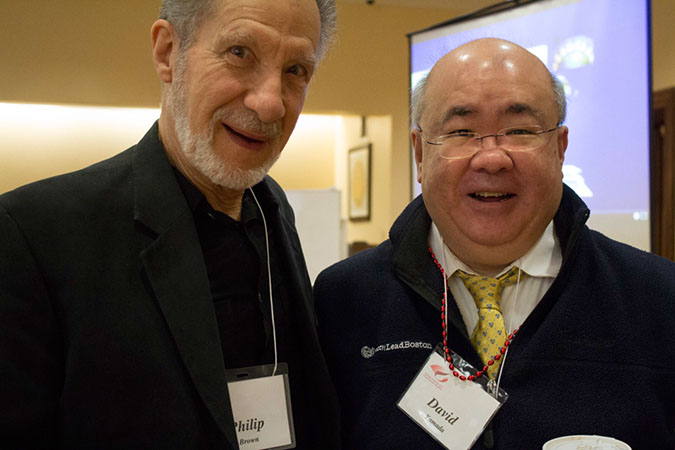
How we usually go about: Every contributor has ca. 7-10 minutes to present her entry point into the dialogue, then we have an open dialogue. We have 2 empty chairs in the circle that can be taken by participants from the audience who wish to introduce a question or comment. We have two moderators for each Round Table. In that way, the Moderators are not prevented from also being contributors to the dialogue: while one Moderator makes a contribution to the dialogue, the other takes over as Moderator, and vice versa (with only one Moderator, this kind of flexibility would be lacking). We kindly invite the Moderators to summarize the contributions immediately following the dignilogue, and identify three "Key Learning Points" from the dialogue."
Peace Linguist Francisco Gomes de Matos commented on this format as follows (May 2, 2012): "It enhances RELATIONAL DIGNITY. Everyone will make the most of such dignifyingly used time! A great humanizing, interactive format: a little bit of MONOlogue, followed by much DIALOGUE, will help create DIGNILOGUE."
Dignilogue Moderators introduce the contributors (including the moderators), manage time in a supportive and friendly manner, facilitate dialogue after presentations, and summarize highlights.
Dignilogue Contributors present their contributions within the alloted time frame and nurture a lively dialogue
Please see background information created by Linda M. Hartling:
• Dignilogue: An Introduction to Dignity + Dialogue created on 31th May 2015
• Introducing the Open Space Format to the HumanDHS Network, longer version created on 13th August 2012
• Dignilogue Tips and Dynamic Dignilogue List, created on 10th October 2015 for our 2015 New York Workshop
• Our Open Space Dignilogue Format created on 12th August 2012 for our 2012 Norway Conference
• See also A Summary of Our Dignilogue Format created in 2010 for you to download
• See also Appreciative Facilitation: Hints for Dignilogue Moderators, written in February 2006 by Judith Thompson to support the Moderators of our workshops
Honorary Convenor 2003 – 2017: Morton Deutsch
Moderators: David C. Yamada and Adair Linn Nagata
Seating Manager: Rick Slaven
See here a Summary of Our Dignilogue Format for you to download
For the history of Dignilogue 1, see our Past Workshops



• Thursday, December 6, 2018: Please click here to see all of Anna Strout's 204 photos of Day One
• Thursday, December 6, 2018: Please click here to see all Ritu Chopra's 18 photos of Day One
• Thursday, December 6, 2018: Please click here to see all of Rambabu Talluri's 22 photos of Day One
• Thursday, December 6, 2018: Please click here to see all of Evelin Lindner's 54 photos of Day One
Participants in Dignilogue 1:
• Michael L. Perlin (supported in spirit by Alison Lynch and Shelley Kierstead) (Video)
- A Therapeutic Jurisprudence Deconstruction of Seclusion and Restraint Law: Thinking About Humiliation, Shame and Dignity (2018) (Video | Pdf)
- "Them Who Are Slandered and Humiliated": How Marijuana Arrest Patterns Perpetuate a Racist Criminal Justice System and Shame and Humiliate Minority Youth (2017) (Video | Pdf)
- “She’s Nobody’s Child/The Law Can’t Touch Her at All”: Seeking to Bring Dignity to Legal Proceedings Involving Juveniles (2016)
- “Had to be Held down by Big Police”: A Therapeutic Jurisprudence Perspective on Interactions between Police and Persons with Mental Disabilities (2015)• Claudia E. Cohen (Video)
- Confronting Narratives of Hate with Stories of Dignity (2018) (Video | Powerpoint)
- Dignity As a Practice: The Nonhuman Rights Project (2017) (Video)
- Is Dignity Possible During War Time? A Small Act of Humanity... (2016)
- Emotional Awareness: Can it Mitigate Against the Experience of Humiliation and Promote Constructive Conflict Resolution? (2009)• Janet Gerson (Video)
- Climate Catastrophe and Political Discourse (2017) (Video)
- Bullying: Nuclear, Presidential, Patriarchial (2016) (Video)
- Janet also thinks of Leonard Cohen's Hallelujah as having the pain, the humility, and the awe of being human, see 4'38'' or 7'21''• Daniel Rothbart (Video)
- Systems of Humiliation and Compassion in Destructive Conflicts (2018) (Video | Pdf)
- Invading the Mind and Controlling Population Groups: The Power of Systemic Humiliation (2016)• Stephen G. Post (Video)
- Dignity, Humiliation and Deeply Forgetful People (2018) (Video | Pdf)
• Anastasia Taskin Reflected on Stephen Post's contribution (Video)
• Tony Gaskew (Video)
- Learning to Speak the Language of Police Abolition (2018) (Video | Pdf)
- The Metaphysical Nature of Justice (2017) (Video)
- Creating Spaces for Dignity: Policing in Communities of Color (2015) (Video 1, Video 2 next day)
- Rethinking Prison Reentry: Transforming Humiliation into Humility (2014) (Abstract | Pdf | Video)
- Released: Searching for Dignity and Respect Through Prison Re-entry Initiatives (2010)
- The Role of Humiliation and Dignity for Structural, and Political Violence (2009)
• Soprano Hannah Voss Performed (Video)
• Linda Hartling Invited All Participants to Fill Out Their Appreciative Introduction Forms (Video)
• Diane Perlman Explained Her Gift to the Workshop (Video)
• We Always Ask for Permission to Post Photos and Videos (Video 2018 | Video 2017)
• Linda Hartling Invited All Participants to Share Their Dignity Feedback (Video)
1.00 pm - 1.45 pm Lunch & continued Digniloging, Digniposters, Digniart, Dignibeing & Announcements of our News
Lunch in the Cafeteria in the basement of Teachers College, or in the Everett Café at the entrance of the Gottesman Library, or, to avoid long queuing in the cafeteria at noon time, you could bring your own food and eat it in our workshop room.
Afternoon: Turning Ideas into Action
1.45 pm - 3.30 pm Co-Created Dignilogues # 1 - Facilitated by Phil Brown and Linda Hartling (Video)
For the past decade, we have continuously worked to dignify the traditional institution "conference." The Open Space movement originally started from the observation that after mainstream academic conferences, the participants, when asked, often say: "Oh, I slept through the presentations, but the coffee breaks were wonderful!" "Conference programs are replete with monologues that silence all but the speaker. The vitalizing communication is typically found in the hallways, the bars, and the dinner table – the venues of informal conversation," wrote scholar Kenneth Gergen in 2009 (in his book on relational being). In other words, the motivating impetus behind the Open Space approach is that academic conference can be rather boring; invited speakers might not be in tune with the audience; and reading papers aloud may be particularly uncommunicative. The creators of the Open Space approach thought: "Ok, why don't we create conferences that are structured like coffee breaks!" Please read more about the originator of the Open Space Technology, Harrison Owen. See also Open Space Tools by Peggy Holman.
In slight variation of traditional conferences, we therefore aim at co-creating our conferences. We have adapted the Open Space approach, added the term dialogue, and connected it with dignity to form the expression Dignilogue (see also our Video page for how peace linguist Francisco Gomes de Matos has inspired this linguistic creation). Please see an Introduction into the Dignilogue Sessions Format created by Linda Hartling on August 12, 2012, for our 2012 Norway Conference, and read more about the Dignilogue format and what it entails. See also Linda's Dignilogue Tips and Dynamic Dignilogue List, created on October 10, 2015, for last year's workshop, and Gabriela Saab's Dignigardener Tips created on December 6, 2016. See, furthermore, our reflections on Appreciative Nurturing.
This format is very open, it means that a conference is self-organizing. However, when we tried this in our first workshops in New York (for instance, in 2004), it turned out that for our NY participants required more structure. Therefore, we waited until 2012, before we opened up the workshop to self-organize more. We invited participants to be with us without the ambition to "present" something, so that we all could get a feel for the dignity-family-building work that we wish to nurture first and foremost. So, from 2012 onward, the workshop is more open and requires our participants to bring themselves as they are, be prepared for everything, and use the flow to contribute in the most nurturing way they can. As background reading you might enjoy "Are College Lectures Unfair?" by Anne Murphy Paul, The New York Times, September 12, 2015, or When Nothing Is Cool by Lisa Ruddick, Criticism, 2015.
Since 2012, our afternoons were therefore more action oriented than in earlier workshops. Instead of three Pre-Planned Dignilogues, we have only two, and choose to dedicate the afternoons of both days to Co-Created Dignilogues. These Dignilogues focus on topics of interest proposed by the participants. Rather than planning a “presentation,” we encourage everybody to come as they were and enjoy the mutual learning experience of engaging in — or facilitating — authentic, creative conversations that can lead to new ideas and new opportunities for action. Everybody is invited to send an abstract or a paper they wish to share — or to develop a new paper as it might emerge from the inspiration that the workshop experience brings. Everybody is warmly invited to send it to us also after the workshop so we can publish it on this website.
The grand finale of each afternoon is to invite representatives from each Dignilogue to create a Dignivideo, where they document the highlights of their conversation and insights, and more than that, formulate a "message to the world" as it has cristallized in the dignilogue. These videos are treasured contributions to our World Dignity University Library of Ideas that will be shared with the world and will inspire future generations of our community. Please read about the way we work in our newsletter10.
There are two main ways to conduct our WDU videos:
1. Each group can choose two representatives (usually the initiator chooses one participant in the group) and they engage in a short dialogue (example). Advantage: the message may be clearer.
2. The entire group can stand in front of the camera (example). Advantage: everybody is being included.
For our 2015 workshop, we created a new role in our workshop, namely the role of Dignigardener (dignity and gardener) for each Co-Created Dignilogue. This person has the responsibility to remind everybody of the "rules" for Dignicommunication (dignity + communication).
We always encourage all participants of our events to nurture mutually dignifying connections with the other participants and gather together afterwards to experiment with new forms of "conferencing" wherever you live in the world. New solutions are necessary and they need to be nurtured in dignified ways, ways which protect them from being destroyed by being framed in old paradigms (such as those of protest that simply ends in new dominators taking over). See our reflections on appreciative nurturing, or Charles Eisenstein's Reflections on the New Story Summit, or Evelin's text Is it Possible to "Change the World"? Some Guidelines to How We Can Build a More Decent and Dignified World Effectively: The Case of Dignifying Abusers.Dignilogue Topics That Emerged
• Please click here to see the Dignilogue Posters of both days• Co-Created Dignilogues in the Making: Philip Brown Invited into the Co-Created Dignilogues (Video 2018)
• Michael Britton Explained the Concept of the "Dignivideos – Messages to the World" (Video 2017)
• Evelin Lindner Explained the Concept of the "Dignivideos – Messages to the World" (Video 2017)
Co-Created Dignilogue 1: "Therapeutic Jurisprudence" with Michael Perlin and Rambabu Talluri
Message to the World for the World Dignity University (WDU) Initiative (Video)

• Please click here to see the Dignilogue Posters of both days
Co-Created Dignilogue 2: "Relational Dignity" with Janet Gerson, Denyse Kapelus and Diane Sammer
Message to the World for the World Dignity University (WDU) Initiative (Video, unfortunately most of the recording failed)

• Please click here to see the Dignilogue Posters of both days
Co-Created Dignilogue 3: "Stories of Humiliation Reframed as Stories of Dignity" with Claudia Cohen, Talia Shafir, Amy Silverman, Shahid Khan, and Lucien Lombardo
Message to the World for the World Dignity University (WDU) Initiative (Video)

• Please click here to see the Dignilogue Posters of both days
Co-Created Dignilogue 4: "Love, Dignity, and the Deeply Forgetful" with David Yamada, Lyndon Harris, Maria Lund, and Hannah Voss, Following the Earlier Contribution by Stephen Post
Message to the World for the World Dignity University (WDU) Initiative (Video)

• Please click here to see the Dignilogue Posters of both daysCo-Created Dignilogue 5: "Explore Compassion-Motivated Practices" with Daniel Rothbart, Michael Britton, Ariel Lublin, and others
Message to the World for the World Dignity University (WDU) Initiative (Video)

• Please click here to see the Dignilogue Posters of both days
Participants in Co-Created Dignilogues # 1 and # 2 on Day One and Day Two of the Workshop
• Our hosts are always warmly invited to participate in this workshop:
• Eric Marcus, Becca Bass, Aimee Lace, Kim Nguyen, Charlott Macek, and Keerthana Hirudayakanth, of the MD-ICCCR, Teachers College, Columbia University, were all warmly invited to spend as much time with us as possible
• Joshua Fisher, Azin Aliabadi, Kristen Rucki, Meredith Smith, and Connie Sun, of the Advanced Consortium on Cooperation, Conflict, and Complexity (AC4), Earth Institute, Columbia University, were all warmly invited to spend as much time with us as possible
• Harriet Jackson, Teachers College External Affairs, was warmly invited to spend as much time with us as possible
• Venera Kusari, Columbia University, was warmly invited to spend as much time with us as possible


• Bonnie Selterman
- Comments to Dignilogue 1 (2017) (Video)
- Comments to Dignilogue 2 (2017) (Video)
- Poem "No Shoes" (Video | Pdf) (2016)
- Please see her Appreciative Introduction 2015• Avi Shahaf and Nira Shahaf
- Movement As an Attempt to Inquire the Language of Dignity (2018)
- Advancing Dignity in Schools (2010, together with Yoav Peck), presentation given at the 15th Annual Conference of Human Dignity and Humiliation Studies 'Peace at Home, Peace in the World', in Istanbul, Turkey, 28th - 30th April 2010.
- Human Dignity in Israeli Elementary Schools: A Rationale for a Project in Nine Schools (2007, together with Yoav Peck).• Gay Rosenblum-Kumar
- Looking Back on 25 Years of Building Capacities for Conflict Prevention and Transformation in the United Nations (2014)
- Horizontal Inequality and Humiliation: Public Policy for Disaffection or Cohesion? (2005)
- Humiliation, Conflict and Public Policy (2004)• Adair Linn Nagata
• Mara Alagic
• Glyn Rimmington
• Robert Anderson
• Martha Eddy


- Mindful Movement, book talk at Gottesman Libraries on December 6, 2016.• Ann Moradian
• Talia Shafir

- Somatic Psychology and Dignity (2017)• Michael Greene
• Anne Wyatt-Brown
- Learning and Creativity Throughout One’s Life (2016)
- Aging in the Right Place (2016) (see also Stephen Golant's book)
- Humiliation and Resilience in Higher Education (2015)
- From Auschwitz to the International Court of Justice in the Hague (2010)
- The Burden of Palestinian Education: Undoing Humiliation (2009)
- A Holocaust Narrative of Humiliation and Resilience (2008)
- A Challenge to Medical Hierarchies (2007)
- Humiliation In My Brother’s Image (2006)
- A Woman in Berlin: The Complexity of Humiliation at the End of World War II (2005)• Brian D'Agostino
- Militarism, Machismo, and the Regulation of Self-Image. In The Journal of Psychohistory 45 (3, Winter 2018)
Abstract: The topic of militarism could hardly be more timely. In 2015, the world failed to meet the Millennium Development Goals while spending over 1.6 trillion dollars on war and war preparations (Stockholm International Peace Research Institute, 2016), more than ten times what it would have cost to meet them (United Nations Development Program, 2012) [read more]
- Dignity, Humiliation, and Social Transformation, in Psychohistory News, vol. 37, no. 1 (Winter 2018), an overview over the 2017 Workshop on Transforming Humiliation and Violent Conflict, Columbia University, New York City, December 7 - 8, 2017.
- Militarism, Machismo, and the Regulation of Self-Image, in The Journal of Psychohistory 45 (3, Winter 2018)
Abstract: The topic of militarism could hardly be more timely. In 2015, the world failed to meet the Millennium Development Goals while spending over 1.6 trillion dollars on war and war preparations (Stockholm International Peace Research Insti- tute, 2016), more than ten times what it would have cost to meet them (United Nations Development Program, 2012).• Nachiketa Mittal
- Please see his Appreciative Introduction 2018
• Rita Mittal
• Cecilia Rothschild
• Erin Hilgart
• Sowmya Kshtriya for Ani Kalayjian
- Transforming Humiliation Through Soul-Surfing: Movement and Breathing (2017)
- Align with Mother Earth (2016)
- I Am a Syrian Refugee (2015) (Pdf | Video)
- Transforming Horizontal Violence in Haiti through 7-step Integrative Healing Model, and Forgiveness and Peace Gardens (with Lorraine Simmons, 2015)• Janice Gilligan White

• Denyse Kapelus
• Amy Silverman
• Davon Woodley
• Rebecca Mohr
• Xiaojue Hu
• Fatma Susan Tufan
• Roberta L. Kosberg
• Lucien Lombardo
- Learning the Language of Dignity and Humiliation in Childhood (2018)
- Bringing Human Dignity to Work and Workplace through the Study of Work, outline for the "Work and Professional Studies" degree program developed at the Old Dominion University Norfolk, VA, shared at the 2014 Workshop on Transforming Humiliation and Violent Conflict, Columbia University, New York City, December 4-5, 2014.• Anastasia Sarantos Taskin
- Please see her 2017 Appreciative Introduction
• Judit Révész and Ikhlaq Hussain
- Judit Révész Introduced Herself (Video 2017)
• Orpa Navot
• Fred Ellis
• Christine de Michele
• Marta Carlson
- Please see her Appreciative Introduction 2018
• Katherine Stoessel

- Please see her Appreciative Introduction 2018• Ariel Lublin and Francis Mead



- Ariel Lublin Introduced Herself (Video 2017)• Beth Boynton
• George Chidieber Iheanacho
• Larry Lee
- Please see his 2018 Appreciative Introduction
• Diane Perlman
• Diane Sammer
• Michele Risa
• Annie Lewall
• Shahid Khan and family
• Peter Pollard
• Heather McClellan
• Elaine Meis
• Ritu Chopra
• Talia Werber
• Dustin Hausner
• Tamar Gur
• Russell Daisey
• Barbara Barnes
• Hazel Reid
• Ed Havlovic
• Camilla Hsiung
• Adriana Melasecca
• Mimi Evans
• Monika Gude
• Debbie Joffeé Ellis
- Rational Emotive Behavior Therapy (REBT)
These participants were unfortunately hindered to participate:
• Debidatta Aurobinda Mahapatra
- Nature, Dignity and Conflict: A Perspective from Indian Philosophy (2017)
"The tension between the Gandhian vision of Gram Swaraj (village self-rule) and the Nehruvian vision of heavy industrialization contributed to this friction. The paper, while focusing on these tensions, factors dignity in the analysis, and emphasizes how the undermining of dignity has contributed to ecological imbalance in India.""We can certainly realize our full destiny and dignity only if we educate and train ourselves to be able to refrain from retaliation." ― Mahatma Gandhi.• Merle Lefkoff and Joni Carley
- Indigenous Knowledge and the New Science of Complex Adaptive Systems (see Video) (2016)
- When the Butterfly Flaps Her Wings in Gaza (2005)• Doaa Rashed
- How Can We Cultivate Dignity (2017) (Video)
• Annette Anderson-Engler
- Humiliation Through Silent Grief in Women: When Words Are Not Enough (2010)
- Shared Narratives: The “Voice” of Personal and Social Identity – Are We Listening? (2009)
- Constructing and Reconstructing Narratives – A Passageway to Personal Meaning and Social Change (2007)
- Displaced Identity and Humiliation in Children of Vietnam Veterans (2005)
- Humiliation and Displaced Identity (2004)• Grace Feuerverger
- The Fairy Tale as a Pathway Toward Dignity for Children of War and Other Oppressions (2016)
- Auto-Ethnographic Reflections on the Immigrant and Refugee Experience in an Inner-city High School in Toronto (2012)
- Acts of “Great Generosity of Spirit”: The Classroom as a Pathway Toward Abundance and Dignity (2011)
- On the Child's Right to Identity, the Best Interests of the Child and Human Dignity (2009)
- Teaching and Writing Vulnerably: An Auto-Ethnography about Schools as Places of Hope (2009)
- Building Bridges to Peace and Social Justice: An Emancipatory Discourse in a Jewish-Palestinian Village in Israel (2006)
- The "School For Peace": A Conflict Resolution Program in a Jewish-Palestinian Village (2005)• Sasha Moore (Video)
- Please see her Appreciative Introduction 2017
- An Intercultural Communicative Competency Handbook for Law Enforcement Personnel: The Transgender Community and Beyond (2017) (Video)• Renée Monrose
See Renée Monrose's Face-to-Face exhibition at the Union Theological Seminary
• Eileen Barker and Russell Wilkie
- Forgiveness as a Path to Dignity (2016)
• Jackie Wasilewski and Marek Kaminski
- The Role of Dignity and Humiliation in Indigenous Cultures and Its Usefulness for Global Dialogue (2009)
- Transforming Humiliation: Spiritual and Dialogic Aspects (2011)• Gabriela Saab
- Empathy, or Why Humanity Cannot See Itself as One Group and How We Could Change That from a Local Perspective (2016)
• Mariana Ferraz
- Please see his Appreciative Introduction 2016
• Rita Anita Linger
- Enhancing Dignity and Reducing Humiliation through the Practice of Mind-Body Skills (2016)
• David Yau-Fai Ho and Guangdong "Nina" Shao
- David's Expressive Dance to Ambush from Ten Sides (2016)
Published on 26 Aug 2016: Yo-Yo Ma is my hero who champions intercultural fertilization in the musical realm. The Silk Road Ensemble he has created is indeed a meeting of strangers who will enrich the musical world across cultures. The piece “Ambush from Ten Sides” is a real success in intercultural fertilization. Its militant tenor invites an interpretation with martial arts as a central component.
- Madness, Violence, and Human Dignity: Transforming Madness for Dignified Existence (2015)• Maggie O'Neill
- Humiliation, Social Justice and Ethno-mimesis (2005)
- Forced Migration, Humiliation and Human Dignity: Re-Imagining the Asylum-Migration Nexus through Participatory Action Research (PAR) (2006)
- Humiliation and Human Dignity: Conducting Participatory Action Research with Women Who Sell Sex (see www.safetysoapbox.com) (2007)
- Humiliation, Social Justice and Recognitive Communities: Thinking about the Asylum-Migration-Community Nexus in the Context of HDHS (2012)
- Refugee Women, Human Rights and Belonging: Educating for Dignity (2013)• Carol Smaldino and Angelo Smaldino
- As a Therapist: Cultivating the Dignity of Being Ourselves(2016)
- see also:
- "In a Dialogue: In a Dignilogue," by Carol Smaldino, Huffington Post, December 20, 2016
- "Finding Dignity in Emotional Anguish," by Carol Smaldino, Huffington Post, December 29, 2016
- Vulnerability Protected: Respecting the Rawness of Vulnerability and Giving it the Protection it Needs (2015)• Jonathan Cohen
- Please see his Appreciative Introduction 2017
• Barbe Chambliss
• Mecke Nagel
- Troubling Justice: Towards a Ludic Ubuntu Ethic (2016)
• Jillian Post
- Please see her Appreciative Introduction 2017
• Bruno Varela
- Bruno Varela Introduced Himself (Video 2017)
• Barbara DeCosta
- Barbara De Costa Introduced Herself (Video 2017)
• Barbara Bodine
- Barbara Bodine Introduced Herself (Video 2017)
• Kayhan Irani
- Theatre for Social Change (2018)
• Cornelia Zelter
• Joni and William Baird
- Joni and Bill Baird co-direct a non-profit organization for women’s rights. Bill Baird’s U.S. Supreme Court case, Baird v. Eisenstadt, legalized birth control in the U.S. in 1972.
• Brandon Scott and his brother Kyle Scott
• Irene Javors
- Do Ask; Do Tell: Contemporary Questions For Psychohistorians and Psychobiographers (2017)
- Please see her 2017 Appreciative Introduction• Fonkem Achankeng I and Ndemazea Fonkem, daughter of Fonkem Achankeng I
- Understanding the British Southern Cameroons' Restoration of Statehood: Internal Affair or Decolonization Conflict (2018) (Pdf)
- Imperial Dispossession of ‘Others’ by Falsification of Dignity (2017) (Video | Pdf | Powerpoint)
- The Dignity of the Commons: Re-imagining Life Experiences from the Poor & Homeless to International Politics (2016) (Pdf | Powerpoint)
- Human Dignity & A World Beyond War: Partnerships and Collaborations in Our Global Commons (2015)
- You are invited to learn more about the history of the conflict in British-Cameroon from a debate organized in South Africa and Voices from Ambazonia, to see one of Fonkem's articles on the conflict, and a letter addressed to the President of Republique du Cameroon by a party in the country in 2012. See also a piece on the conflict in Cameroon published in E-International Relations in 2018.• Qin Shao
• Liliana Lisbão
• Melissa Lisbão
• Zuzana Luckay Mihalčinová
• Karen Hirsch
• Rana Tanver
• Maria E. Guillen
• Tony Allicino
• Susan Scharf
• Rabbi Bob Kaplan
4.45 pm - 5.00 pm Wrapping up Day One
• Soprano Hannah Voss Performed (Video)
• Classical Indian Singer Yesupadam Bobbili Performed (Video)
• Soprano Hannah Voss Performed Again (Video)
5.00 pm End of Day One of our workshop
5.00 pm - 7.00 pm Public Event, "The Language of Leading with Dignity," Columbia University, Teachers College, Everett Lounge
Everybody who is interested is always invited to our Public Events, entrance is free, our work is a labor of love and we offer it as a gift!
Please click here to see all of Anna Strout's 116 photos of this Public Event!
The Language of DIGNITY Elevates Humility for the Good of Humanity
By Francisco Gomes de Matos, Co-founder, ABA GLOBAL EDUCATION, Recife, Brazil
Author of DIGNITY: A Multidimensional View, Dignity Press, 2013
• Linda Hartling, Director of Human Dignity and Humiliation Studies (HumanDHS), greeted everybody
• Musical contribution: In the spirit of our motto of Unity in Diversity, the evening always begins with Fred Ellis and his young students, singing songs from many cultural backgrounds (Video)
• Thursday, December 6, 2018: Please click here to see all of Anna Strout's 116 photos of the Public Event
• Richard Slaven, Ph.D.: The Language of Leading with Dignity (Video)
Starting out as a nuclear engineer, Richard Slaven spent 40 years working as a public school educator, principaL superintendent, and then the administrator for the School of Physics at Brandeis University.
Honoring Richard Slaven, Ph.D. (Video)
• Dignilogue Panel: The Language of Leading with Dignity
Linda Hartling, Evelin Lindner, Philip Brown, Janet Gerson, David Yamada, Michael Britton, Chipamong Chowdhury, and Avi Shahaf
• Musical Contribution: Flutist Suki Rae
Suki Rae is is a classically trained flutist, singer, and songwriter. She has been performing internationally in festivals, concerts, churches, ad infinitum for over thirty years. Thank you so much, dear Rose Sherwin and musicologist Michael Sherwin, for introducing Suki Rae to us!
• Flutist Suki Rae Introduced Herself
• Flutist Suki Rae Performed
• Flutist Suki Rae Performed and Participants Danced
• Flutist Suki Rae Performed and Participants Danced (Chipamong Chowdhury's recording)
• Saying Good-Bye
• 7.00 pm Ending our Public Event
War Words Teach Us: We Need Spoken Remedies for Peace
A list of militaristic and other aggressive language in everyday speech for our consideration as we seek to use more friendly and inclusive ways of saying.
This list was drafted by Kim Stafford and students, as we listened to the language all around us, October 2018.
THE LANGUAGE OF DIGNITY: A PEACE LINGUIST'S VIEW
By Francisco Gomes de Matos, Co-founder, ABA GLOBAL EDUCATION, Recife, Brazil
Author of DIGNITY: A Multidimensional View, Dignity Press, 2013
The Language of Dignity
humbles our intellect
and also challenges our conduct to be perfect
The Language of Dignity seeks our character to elevate
and it also helps our everyday communication to sublimate
The Language of Dignity interacts with the Lexicon of Positivity
and it also reflects a deep commitment to Peace and spirituality
The language of Dignity is 3C:
Character, conduct, and constructive communication
When we use the Language of Dignity
We contribute to the Good of Humanity
Day Two, Friday, December 7, 2018, Columbia University, Teachers College (the program will emerge on this page over time, please return to this page regularly)

We so much thank Anna Strout and many others, for taking such lovely photos!
The still photos come in several web galleries:
• Friday, December 7, 2018: Please click here to see all of Anna Strout's 297 photos of Day Two
• Friday, December 7, 2018: Please click here to see all of Evelin Lindner's 80 photos of Day Two
• Friday, December 7, 2018: Please click here to see 9 of Anna Strout's photos of Linda and Evelin on Day Two
• Friday, December 7, 2018: Please click here to see the Dignilogue Posters
Rick Slaven Always Leads with Humor, on Nametags (Video 2017)
• Classical Indian Singer Yesupadam Bobbili Performed (Video)
• New Arrivals Introduced Themselves (Video)
• Linda Hartling Welcomed All Participants and Shared Practical Details (Video)
10.15 am - 11.00 am What Is the Language of Dignity? (Video)
Michael Britton always holds our Don Klein Celebration Lecture in the place of the lecture that Don Klein held each year until he passed away in 2007, titled The Humiliation Dynamic: Looking Back... Looking Forward
Michael Britton is a Member of the HumanDHS Board of Directors, the HumanDHS Global Core Team, and a Member of the HumanDHS Global Coordinating Team, as well as Co-Director and Co-Coordinator of the HumanDHS Stop Hazing and Bullying Project. He is also the HumanDHS Director of "Global Appreciative Culturing."
Michael is concerned with integrative thinking across neuroscience, in-depth psychotherapies and historical/cultural living, Michael's work looks at how participation in the historical life of our times and interior life are deeply intertwined. See an introduction to Michael Britton and his work by Reinaldo Rivera (Video).
Donald Klein was a Professor Emeritus of the Union Institute and University, Cincinnati, Ohio, USA. He was a Member of the HumanDHS Board of Directors, a Member of the HumanDHS Global Advisory Board and Global Core Team. To our immense sadness, our beloved Don Klein passed away in June 2007. We are still heartbroken. We commemorate his memory with great love. He spoke to us about Awe and Wonderment. About our human ability to live in awe and wonderment, not just when we see a beautiful sun set or the majesty of the ocean, but always. That we can live in a state of awe and wonderment. And we do that, said Don, by leaving behind the psychology of projection. The psychology of projection is like a scrim, a transparent stage curtain, where you believe that what you see is reality only as long as the light shines on it in a certain way. However, it is not reality. It is a projection. And in order to live in awe and wonderment, we have to look through this scrim and let go of all the details that appear on it, in which we are so caught up. When we do that, we can see the beautiful sun set, the majestic ocean, always, in everything. We will continue our work while keeping Don’s words at the center of our work and in our hearts.
In 2008, Michael Britton prepared thank-you cards for the workshop participants and helpers and he chose this picture of a scrim to honor Don's memory:
• Hannah Voss Performed (Video)
• Rick Slaven, Director of Dignifunding (Video)
11.00 am - 12.15 pm Pre-Planned Dignilogue 2: How Can We Cultivate Dignity?
Please note that this title is meant to serve only as an inspiration; the topic of humiliation is so new and multifaceted, as is dignity, that we do not wish to force it into too rigid and narrow structures
Honorary Convenor: Morton Deutsch
Moderators: Michael L. Perlin and Janet Gerson
Seating Manager: Rick Slaven
See here a Summary of Our Dignilogue Format for you to download
For the history of Dignilogue 2, see our Past Workshops

The still photos come in several web galleries:
• Friday, December 7, 2018: Please click here to see all of Anna Strout's 297 photos of Day Two
• Friday, December 7, 2018: Please click here to see all of Evelin Lindner's 80 photos of Day Two
• Friday, December 7, 2018: Please click here to see 9 of Anna Strout's photos of Linda and Evelin on Day Two
• Friday, December 7, 2018: Please click here to see the Dignilogue Posters
Participants in Dignilogue 2
• David C. Yamada
- Dignity Work. What Does It Mean? How Might We Define It? What If We Made the Nurturing of Dignity Our Primary Purpose as Human Beings? What Kind of World Would We See?, Minding the Workplace The New Workplace Institute Blog, November 11, 2018
- Can a Narcissist Feel Your Pain? (Maybe Yes, Study Suggests), by David Yamada, Minding the Workplace The New Workplace Institute Blog, May 31, 2014
- American Elders: Human Dignity and the Aging Population (2012)
- Intellectual Activism: Using Blogs and Social Media to Advance a Human Dignity Agenda (2011)
- The Dignifying Effects of Workplace Bullying Legislation (2009)• Alberto Collazzoni
- The Lack of Dignity and the Negative Consequences of Humiliation (2018) (Pdf | Powerpoint)
- See also Alberto Collazzoni's Appreciative Introduction (2018)

• Aura Sofía Díaz, supported by Adair Linn Nagata

• Phil Brown
- The International Center for Assault Prevention (2018) (Powerpoint)
- Developing a Dignifying Culture in K-12 Schools (2017) (Video) See also the book edited by Phil Brown, Student Discipline: A Prosocial Perspective (2016)
- Prosocial Education: Developing Caring, Capable Citizens, abstract presented at the 2012 Workshop on Transforming Humiliation and Violent Conflict, Columbia University, New York City, December 6-7, 2012.
- Prosocial Development: Defining the Basis for Prosocial Education, discussant background notes presented at the 2011 Workshop on Transforming Humiliation and Violent Conflict, Columbia University, New York City, December 8-9, 2011. See also a slide of the Prosocial Double Helix.
- Prosocial Education, prepared by Ann Higgins D'Alessandro, Fordham University, and edited by Philip Brown, Rutgers University, for the 2010 Workshop on Transforming Humiliation and Violent Conflict, Columbia University, New York City, December 9-10, 2010.
- Philip M. Brown kindly guest-edited "Humiliation in the Academic Setting," A Special Symposium Issue of Experiments in Education, published by the S.I.T.U. Council of Educational Research in 2008.
- Reflections on Policy and Humiliation: Addressing the Needs of Poor Minority Children in New Jersey’s Public Schools, draft paper presented at Round Table 3 of the 2005 Workshop on Humiliation and Violent Conflict, Columbia University, New York City, December 15-16, 2005.
- Humiliation, Bullying and Caring in School Communities, paper presented at the Workshop on Humiliation and Violent Conflict, Columbia University, New York City, November 18-19, 2004.• Rambabu Talluri and Fr. Yesupadam Bobbili
- Untouchables Love, Labor and Live (2018)
- Journey with Lenape Tribe for Defending their Rights and Sustainable Development (2017)• Chipamong Chowdhury (family name), or Bhante Revata (monk's name in the monastic communities)
- Mindful Speech (2016)
• Lyndon Harris and Maria Lund
- Forgiveness and Regenerative Positive Emotions: Being the Peace We Wish to See in the World (2018)
- No Future Without Forgiveness: Strategic Aims and Considerations for the Gardens of Forgiveness Movement (Video) (2015)
Topics: 1. What Forgiveness Is/Is Not 2. The Science of Forgiveness 3. Forgiveness as a Tool for Conflict Transformation 4. The Gardens of Forgiveness Movement: From Beirut to the World 5. Tips for Starting Your Own Garden of Forgiveness


• James Shanahan
- Conflict Resolution: Technique and Spirit (2018, an amalgamation of ancient eastern martial arts philosophy and modern psychological theories to build Crisis Intervention Teams for first responders: the “Talk Down Before The Take Down")
- The Role of Dignity and Humiliation for Current Advances in Police Training (2009)
- Conflict Resolution: Spirit & Technique - A comprehensive course taught for law enforcement officers, critical incident workers and other emergency first responders (2012)• Beth Fisher-Yoshida
- Dignity, Negotiation, and Conflict Resolution (2013)
• Danielle Coon had to attend to the inauguration of the new president of Teachers College, Thomas Bailey
12.15 pm - 1.00 pm Lunch & Digniloging, Digniposters, Digniart, Dignibeing, Dignimovement & Announcements of our News, including the 2016 Dignity Press flyer
Lunch in the Cafeteria in the basement of Teachers College, or in the Everett Café at the entrance of the Gottesman Library, or, to avoid long queuing in the cafeteria at noon time, you could bring your own food and eat it in our workshop room
• Guitarist Carmen Alejandro Valle: Interlude (Video)
Dear Judit Révész and Ikhlaq Hussain, thanks so much for bringing Carmen to us! (Video)
And thanks for accompanying her, dear Sherissse Alvarez and Hubert Naranjo!
1.00 pm - 1.45 pm Appreciations, Recognitions, Remembrances, and Awards: Lifetime Achievement Award Celebration
Janet Gerson Received the Human Dignity (Half!) Lifetime Award! (Background | Video)
What an honor! Thank you so much, dear Holly Holland and Amy Taliafarro, for bringing also dear Betty Reardon, the Mother of Peace Education, to our venue!


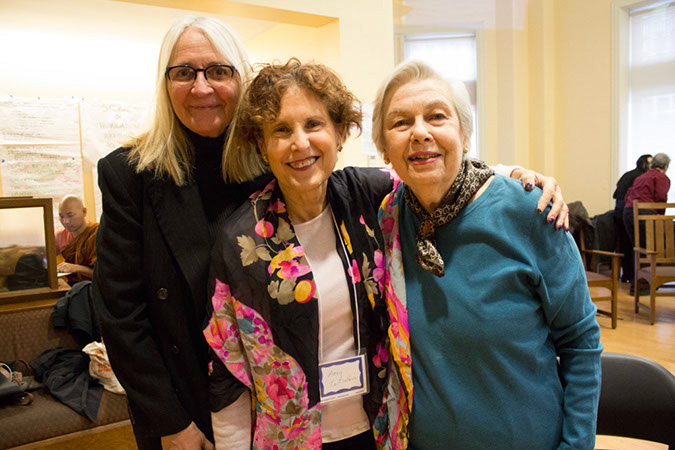
• Honoring Yesupadam Bobbili (Video)
• Honoring the Careholders (Video)
• Honoring Hannah and Angelyn Voss (Video)
• Honoring Evelin Lindner (Video December 5 | Video December 6)
What an honor! Thank you so much, dear Linda, Mike, Chipa, and All of You, for giving me a book as a gift! I have no words! The only way to say thank you was to go down on my knees!
Afternoon: Co-Creating: Turning Ideas into Action
For the history of Dignilogue 3 see our Past Workshops
(until 2013, when it was replaced by co-created dignilogues)
1.45 pm - 3.30 pm Co-Created Dignilogues # 2 - Facilitated by David Yamada and Linda Hartling (Video 2017)
Dignilogue Topics That Emerged
• Please click here to see the Dignilogue Posters of both days• Co-Created Dignilogues in the Making: David Yamada Invited into the Co-Created Dignilogues (Video 2018)
• Michael Britton Explained the Concept of the "Dignivideos – Messages to the World" (Video 2017)
• Evelin Lindner Explained the Concept of the "Dignivideos – Messages to the World" (Video 2017)
Co-Created Dignilogue 6: "Forgiveness" with Lyndon Harris
Message to the World for the World Dignity University (WDU) Initiative (Video)

• Please click here to see the Dignilogue Posters of both days
Co-Created Dignilogue 7: "Every Person Has Worth - Because They Are Alive" with Amy Silverman, Debbie Joffe Ellis, Maria Lnd, Camilla Hsiung, Janice Gilligan White, Hannah Voss, and Sowmya Kshtriya (unfortunately the recording partly failed)
Message to the World for the World Dignity University (WDU) Initiative (Video, unfortunately the audio failed after Amy Silveman's introduction)
• Please click here to see the Dignilogue Posters of both daysCo-Created Dignilogue 8: "Law and Justice" with Lucien Lombardo, Nachiketa Mittal, Janet Gerson, Michael Perlin, Peter Pollard, Diane Sammer, and Dustin Hausner
Message to the World for the World Dignity University (WDU) Initiative (Video)

• Please click here to see the Dignilogue Posters of both daysCo-Created Dignilogue 9: "Dalits in India" with Rambabu Talluri
Message to the World for the World Dignity University (WDU) Initiative (Video)

• Please click here to see the Dignilogue Posters of both daysCo-Created Dignilogue 10: "Nonverbal Language of Dignity and Human Relations" with Nira and Avi Shahaf, Phil Brown, Martha Eddy, Shahid Khan, Rita Mittal, and Tamar Gur
Message to the World for the World Dignity University (WDU) Initiative (Video)

• Please click here to see the Dignilogue Posters of both daysCo-Created Dignilogue 11: "Improv Theater" with Marta Carlson, Christine de Michele, Beth Boynton, Francis Mead, Bonnie Selterman, Fred Ellis, Talia Werber, and Robert Anderson (see more about the Self-Organizing Principles of Improv Theater)
Message to the World for the World Dignity University (WDU) Initiative (Video)
• Please click here to see the Dignilogue Posters of both days
Closing Thank-You Round
We collected appreciative feedback and ideas for collective planning about how to cooperate during the coming year, until we meet again next year
4.15 pm - 5.00 pm Closing Ceremony - Moving into the World (Video 2017)
We thank Kathy Komaroff Goodman for sharing with us What A Wonderful World sung by Louis Armstrong!
We thank
David Yamada for singing with us What a Wonderful World (Video 2017):
I see trees of green, red roses, too,
I see them bloom, for me and you
And I think to myself
What a wonderful world.
I see skies of blue, and clouds of white,
The bright blessed day, the dark sacred night
And I think to myself
What a wonderful world.
The colors of the rainbow, so pretty in the sky,
Are also on the faces of people going by.
I see friends shaking hands, sayin', "How do you do?"
They're really sayin', "I love you."
I hear babies cryin'. I watch them grow.
They'll learn much more than I'll ever know
And I think to myself
What a wonderful world!
Linda always reminds of this poem by Oregonian poet Edwin Markham (1852-1940):
Outwitted:
He drew a circle that shut me out -
Heretic, rebel, a thing to flout.
But Love and I had the wit to win:
We drew a circle that took him in!
5.00 pm End of Day Two of our workshop
Prior and Subsequent to our Workshop
See here.
Participants in all NY workshops so far
Papers
All participants are warmly invited to send in full papers after the workshop.
Please notify us, if you wish to submit any of your papers also as a book chapter or as a journal article in our Journal of Human Dignity and Humiliation Studies.
Please see earlier submitted papers here:
• List of all Publications
• 2004 Workshop on Humiliation and Violent Conflict
• 2005 Workshop on Humiliation and Violent Conflict
• 2006 Workshop on Humiliation and Violent Conflict
• 2007 Workshop on Humiliation and Violent Conflict
• 2008 Workshop on Humiliation and Violent Conflict
• 2009 Workshop on Humiliation and Violent Conflict
• 2010 Workshop on Transforming Humiliation and Violent Conflict
• 2011 Workshop on Transforming Humiliation and Violent Conflict
• 2012 Workshop on Transforming Humiliation and Violent Conflict
• 2013 Workshop on Transforming Humiliation and Violent Conflict
• 2014 Workshop on Transforming Humiliation and Violent Conflict
• 2015 Workshop on Transforming Humiliation and Violent Conflict
• 2016 Workshop on Transforming Humiliation and Violent Conflict
• 2017 Workshop on Transforming Humiliation and Violent Conflict
Abstracts/Notes/Papers of 2018
Please see further down the papers/notes that participants send in prior to the workshop so that everybody can get acquainted with all others beforehand.
See here the work by:
Andrea Bartoli
Linda M. Hartling
Donald C. Klein
Victoria C. Fontan
Evelin G. LindnerClaudia E. Cohen (2018)
Confronting Narratives of Hate with Stories of Dignity (Video | Powerpoint)
Contribution shared at the 2018 Workshop on Transforming Humiliation and Violent Conflict, Columbia University, New York City, December 6 -7, 2018.Philip M. Brown (2018)
The International Center for Assault Prevention (Powerpoint)
Contribution shared at the 2018 Workshop on Transforming Humiliation and Violent Conflict, Columbia University, New York City, December 6 -7, 2018.
Alberto Collazzoni (2018)
The Lack of Dignity and the Negative Consequences of Humiliation (Pdf | Powerpoint)
Contribution shared at the 2018 Workshop on Transforming Humiliation and Violent Conflict, Columbia University, New York City, December 6 -7, 2018.David C. Yamada (2018)
Dignity Work. What Does It Mean? How Might We Define It? What If We Made the Nurturing of Dignity Our Primary Purpose as Human Beings? What Kind of World Would We See?
Minding the Workplace The New Workplace Institute Blog, November 11, 2018. Contribution shared at the 2018 Workshop on Transforming Humiliation and Violent Conflict, Columbia University, New York City, December 6 -7, 2018.Lucien Lombardo (2018)
Learning the Language of Dignity and Humiliation in Childhood
Contribution shared at the 2018 Workshop on Transforming Humiliation and Violent Conflict, Columbia University, New York City, December 6 -7, 2018.Tony Gaskew (2018)
Learning to Speak the Language of Police Abolition (Video | Pdf)
Contribution shared at the 2018 Workshop on Transforming Humiliation and Violent Conflict, Columbia University, New York City, December 6 -7, 2018.Rambabu Talluri (2018)
Untouchables Love, Labor and Live
Contribution shared at the 2018 Workshop on Transforming Humiliation and Violent Conflict, Columbia University, New York City, December 6 -7, 2018.Stephen G. Post (2018)
Dignity, Humiliation and Deeply Forgetful People (Video | Pdf)
Contribution shared at the 2018 Workshop on Transforming Humiliation and Violent Conflict, Columbia University, New York City, December 6 -7, 2018.Daniel Rothbart (2018)
Systems of Humiliation and Compassion in Destructive Conflicts (2018) (Video | Pdf)
Contribution shared at the 2018 Workshop on Transforming Humiliation and Violent Conflict, Columbia University, New York City, December 6 -7, 2018.Fonkem Achankeng I (2018)
Understanding the British Southern Cameroons' Restoration of Statehood: Internal Affair or Decolonization Conflict (Pdf)
Contribution shared at the 2018 Workshop on Transforming Humiliation and Violent Conflict, Columbia University, New York City, December 6 -7, 2018.Michael L. Perlin and Alyson Lynch (2018)
A Therapeutic Jurisprudence Deconstruction of Seclusion and Restraint Law: Thinking About Humiliation, Shame and Dignity (Video | Pdf)
Contribution shared at the 2018 Workshop on Transforming Humiliation and Violent Conflict, Columbia University, New York City, December 6 -7, 2018.Chinwe Obianika (2018)
Language Prestige, Human Dignity and Humiliation of Indigenous Peoples of Nigeria: Historical and Current Issues
Abstract prepared for the 2018 Workshop on Transforming Humiliation and Violent Conflict, Columbia University, New York City, December 6 - 7, 2018.Kingsley Okoro (2018)
African [Igbo] Holism: A Model for the Contemporary Quest for an Integrated Community
Abstract prepared for the 2018 Workshop on Transforming Humiliation and Violent Conflict, Columbia University, New York City, December 6 - 7, 2018.
Brian D'Agostino (2018)
Dignity, Humiliation, and Social Transformation
In Psychohistory News, vol. 37, no. 1 (Winter 2018)
An overview over the 2017 Workshop on Transforming Humiliation and Violent Conflict, Columbia University, New York City, December 7 - 8, 2017.Brian D'Agostino (2018)
Militarism, Machismo, and the Regulation of Self-Image
In The Journal of Psychohistory 45 (3, Winter 2018)
Abstract: The topic of militarism could hardly be more timely. In 2015, the world failed to meet the Millennium Development Goals while spending over 1.6 trillion dollars on war and war preparations (Stockholm International Peace Research Institute, 2016), more than ten times what it would have cost to meet them (United Nations Development Program, 2012).
Ideas for More Dignilogue Topics
Your input is very welcome!
Ani Kalayjian kindly wrote (July 9, 2009):
Can we have a special section at the December Conference for highlighting both of these volumes, as well as the forgiveness book which will be in print on Aug 4th right at the APA Convention in Toronto. We could get some of the authors of the forgiveness book on a panel addressing: Slavery, denial, US prisoners, Sudan Genocide (these authors are living in this geographic area). We can also do the same another panel on the II volumes that you contributed in focusing on rituals to transform humiliation into empowerment.
Karen Murphy kindly wrote (November 25, 2009):
I was thinking that CBS’ 60 Minutes Investigation of Congo’s Conflict Minerals on November 29, 2009 (see Enough's new Conflict Minerals web portal), would be a very interesting opportunity/resource for a roundtable, evening event, that is, using the 60 Minutes episode to raise awareness and to provide a context for discussion about the ways that we can make a difference in our daily lives to improve (even, in this case, save) the lives of others. Wishing you well and very grateful for you and your work--Karen
60 Minutes Episode on Conflict Minerals
If you have a cell phone in your pocket or a gold ring on your finger, you are directly linked to the deadliest war in the world. How is that possible? For over a century, the Democratic Republic of the Congo has been plagued by regional conflict and a deadly scramble for its vast natural resources. The conflict in eastern Congo today - the deadliest since World War II - is fueled in significant part by a multi-million dollar trade in minerals. Armed groups generate an estimated $180 million each year by trading four main minerals: the ores that produce the metals tin, tantalum, tungsten, and gold. This money enables the armed groups to purchase large numbers of weapons and continue their campaign of rape and brutal violence against civilians, with some of the worst abuses occurring in mining areas. After passing through traders, smelters, and component manufacturers, these materials are placed in jewelry and electronic devices, such as cell phones, portable music players, and computers, and sold in the United States. See also www.enoughproject.org/conflict-minerals.
Karen Murphy kindly wrote (January 28, 2009):
I am writing with an idea for the conference.
Have you had the chance to read Samantha Power's book Chasing the Flame? It's about Sergio Vieira de Mello and his work in various countries emerging from mass violence. Based on his life's work, Power proposes several key principles. One of them is dignity.
The book is the first product in a campaign that focuses on foreign policy. There is also a documentary (premiering this month at Sundance film festival) and a feature film by Terry George. In addition, there is a website that explores the key issues, www.chasingtheflame.org, and www.chasingtheflame.org/2008/08/the-principle-o.html (for an example of one of my blogs).
I was thinking that it would be so interesting to loop your work into this campaign. Perhaps members of the conference could read the book and then discuss it at a roundtable. You could then post blogs on the site or write in other forums.
It would be so interesting to bring your research into this conversation on foreign policy, nation building, national reconstruction and reconciliation, etc. As you might know, Samantha Power has played and continues to play a key role in Obama's foreign policy - looping your work into the website would be a way to bring it to a wider audience and a way to help shape this emerging conversation.
January 29, 2009:
I'm sure we can get copies of the book at a discounted price for conference attendees - and I'd love to think about how you might take the foreign policy lens and apply your scholarship - and perhaps then post as blogs for www.chasingtheflame.org, thus broadening their audience and yours. Best, Karen
Floyd Webster Rudmin:
"Asymmetries in self-perceptions of being the humiliatee versus the humiliator"
"Archetypal humiliation in literature: A survey of English literature teachers"
Annette Anderson-Engler:
"Constructing Narratives after Violent Conflict"
Annette kindly wrote on March 31, 2006: "I would like to discuss how individuals construct their narratives after traumatic experiences or event."
Dharm P. S. Bhawuk:
"Theory, Method, and Practice of Humiliation Research"
This could also be a topic for our Open Space
Ana Ljubinkovic:
"Assistance and Humiliation"
Varda Mühlbauer:
"Humiliation/Dignity in the Workplace"
"Humiliation/Dignity in the Family"
Zahid Shahab Ahmed:
"Humiliation and Child Sexual Abuse"
Victoria C. Fontan:
"Terrorism and Humiliation" and
"Armed Conflict, Escalation and Humiliation"
Miriam Marton:
"Consequences of Humiliation"
Jörg Calliess:
"How to Prepare 'Non-Psychologists' (Human Rights Defenders, Peace Keepers, etc.) for Dealing with the Trauma of Humiliation in Victims"
Emmanuel Ndahimana:
"Ignorance and Humiliation"
Arie Nadler:
"Justice and Humiliation"
Alicia Cabezudo:
"Interlinking Peace Education and Humiliation Studies: A Bridge for Crossing Borders"
Material


